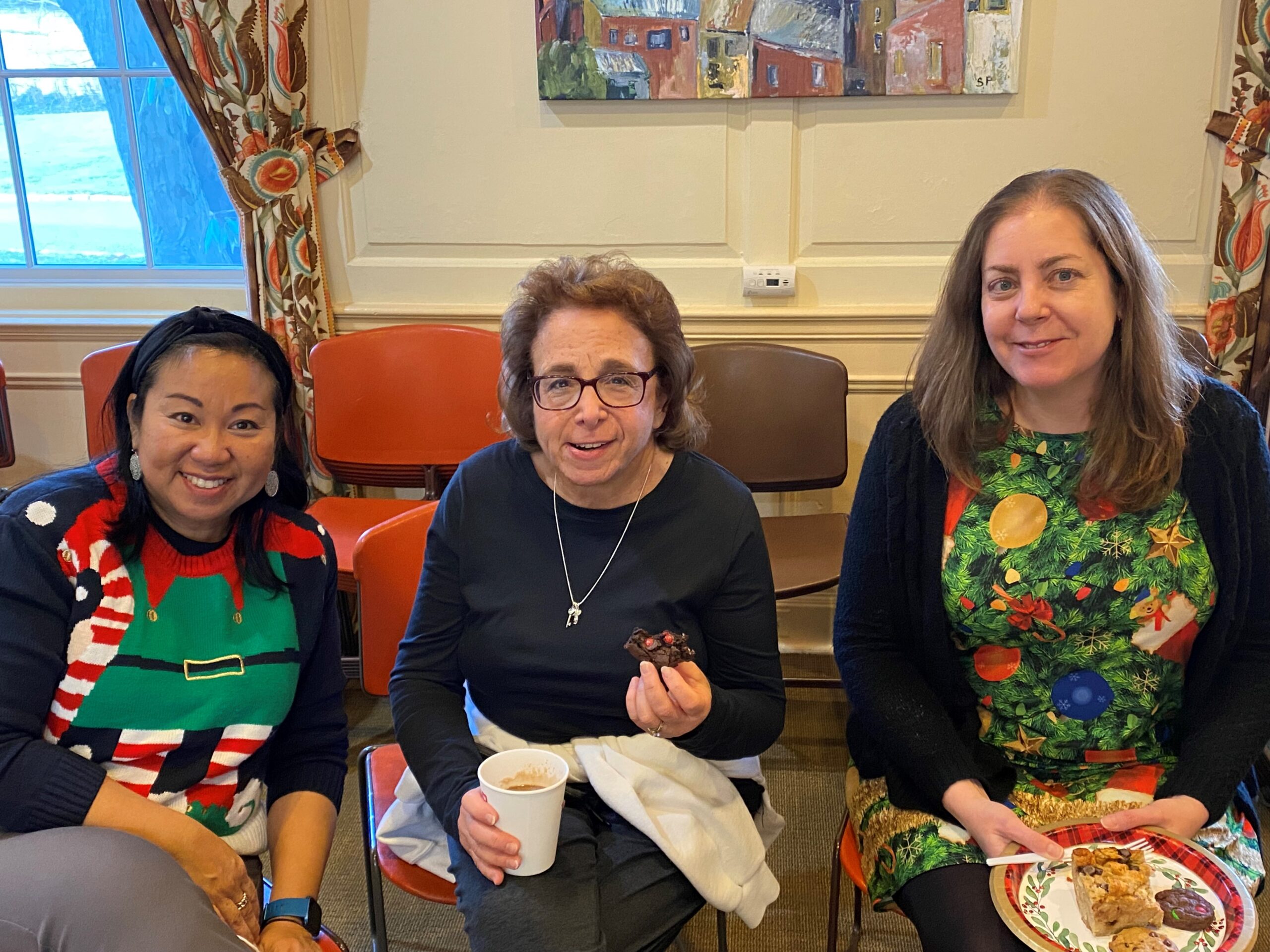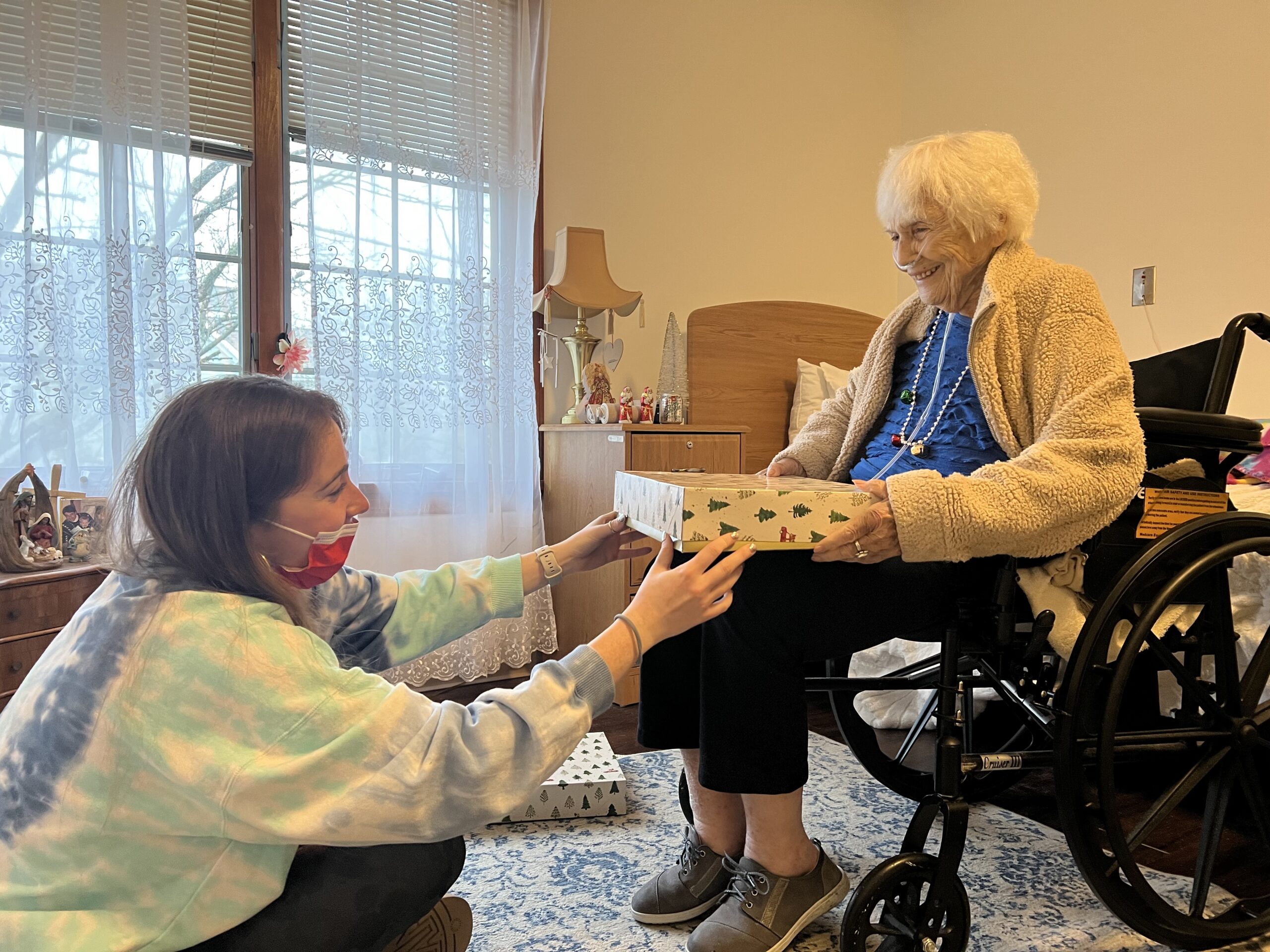
by North Shore Child & Family Guidance Center | Apr 17, 2024 | Anton Community Newspaper, Anton Media, Blog
By Kathy Rivera
Transitioning from school to the job hunt is a daunting yet pivotal phase in the life of every young adult. As your child embarks upon this important journey, they may feel a mixture of excitement, fear, and worry, and not without reason. Job seekers today face more uncertainty than ever, with the latest unemployment rate for young high school graduates falling at 7.9 percent. Recent college graduates fare slightly better with an unemployment rate of 4.8 percent, though this number is nearly double that of all workers with a college degree, according to the Federal Reserve Bank of New York.
As parents, it can be difficult to balance positive reinforcement while managing expectations. Unemployment affects not only the job seeker, but the family unit as a whole, hindering the independence you want for your child. The psychological effects of rejection are amplified the longer the job hunt continues, so it is vital to understand what you can do to best support your child throughout this phase of their life.
Be patient
It’s important for parents to understand that the job market is vastly different today than it was when they were young jobseekers. Gone are the days of walking into a business and handing the owner a resume with the expectation of receiving an interview later that week. Today, candidates can expect to send out dozens, if not hundreds of applications with little to show for it. According to Pew Research Center, 39% of Millennials have a Bachelor’s degree or higher, making them the most educated generation to date, and that number continues to climb with Generation Z. These impressive numbers have created a highly competitive job market, resulting in more college graduates finding themselves in roles that don’t use their degree.
Provide encouragement
After submitting countless applications with nothing to show for it, it’s understandable for your child to feel demoralized or even hopeless. However, it is crucial to motivate your child to continue their search and build upon their skill sets, tailor their resumes to specific jobs, and network with professionals in their field. Remind them that they aren’t alone in feeling discouraged, but that there is a job waiting for them.
Establish healthy coping mechanisms
Constant rejection can be difficult to deal with. Let your child know that it’s okay to experience feelings of sadness, anxiety, and frustration when unemployed, but they shouldn’t let that consume them. Encourage them to take breaks from the application process to relax with friends and loved ones, enjoy their hobbies, and take time away from the computer. Stress-management techniques such as breathing exercises, meditation, and mindfulness will help them through overwhelming feelings during the hunt. Self care is crucial in avoiding burnout when applying for jobs and maintaining strong mental health.
Trust that they know what is best
It makes sense to want updates on how the job search is going, especially if your child is living at home. Despite this, try to refrain from asking for updates too frequently, as this can create further pressure for your child. If they have any promising leads, trust that you will be the first to know. Today’s young adults have a better understanding of the current job market than you may, so allow them to explore their options, make mistakes, and grow on their own.
By adopting these approaches, we can not only help our children overcome the burden of unemployment but help them to foster the independence and resilience needed to thrive in a professional landscape, all while maintaining their mental well-being.
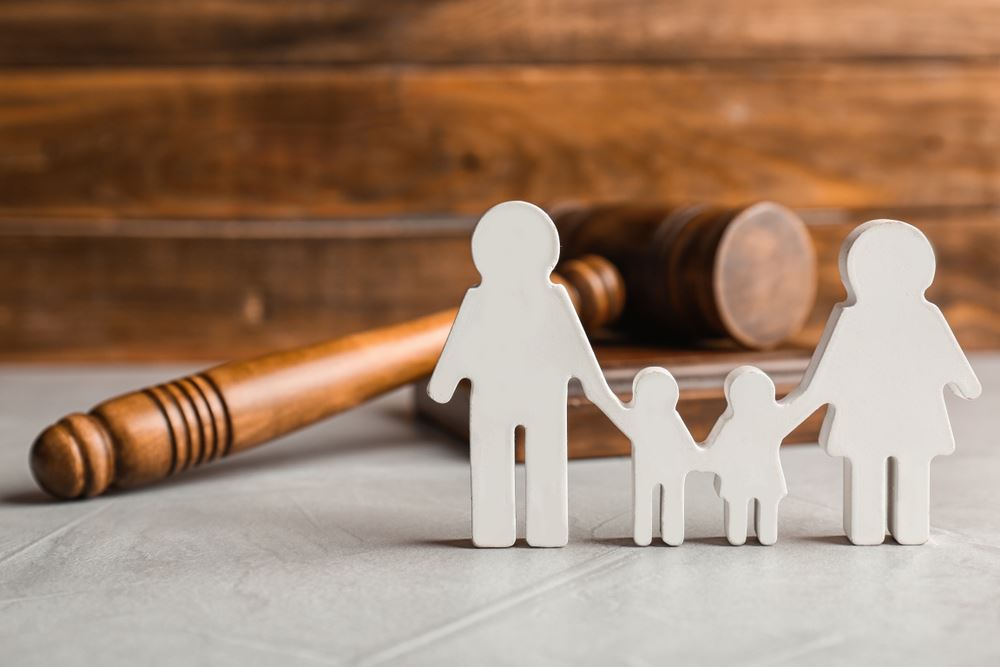
by North Shore Child & Family Guidance Center | Mar 22, 2024 | Blog
By Dr. Nellie Taylor-Walthrust
Family court proceedings can have a profound and lasting impact on children, often resulting in emotional and psychological trauma. The adversarial nature of family court, where parents may be pitted against each other in legal battles, can create an environment of stress, uncertainty, and instability for children. As many parents do not have the luxury of leaving their children at home during these disputes, North Shore Child and Family Guidance Center has committed to protecting the children of our community from the long-lasting impact caused by family court.
Why should kids be kept out of court?
While children often do not have the language to make sense of what is happening inside a courtroom, they are highly attuned to the emotions of adults and can pick up on the tension brewing between their parents. Consistent exposure to conflict can weaken a child’s sense of security and contribute to feelings of powerlessness and vulnerability. When left unaddressed, these emotions spiral into depression, anxiety, and insecurities that often follow into adulthood.
Children caught in the midst of their guardians’ legal battle may feel their relationship begin to strain. One of the primary challenges that can arise is the pressure to choose sides, which can emerge from parental expectations, subtle cues, or observed dynamics in the courtroom. It is important to shield kids from these expectations, as picking a side can result in feelings of guilt and abandonment towards the other parent.
As children bear witness to their family undergoing irreparable changes, they often feel a sense of responsibility for the separation. In trying to make sense of the shift in their family, kids frequently end up believing that they are the cause of their parents’ unhappiness. This is especially true in hearings pertaining to custody and child support when the child is the main topic of conversation.
The Children’s Center
The Children’s Center at Nassau County Family Court is operated by North Shore Child and Family Guidance Center. It is a place of respite for children whose families have business in court. Far from a simple babysitting service, the Children’s Center is an early-learning environment that fosters developmental skills through age-appropriate play, activities, and free books for the children to take home. Every aspect of the Children’s Center is designed with kids in mind, allowing them to explore new things in a structured, professionally supervised way. Though they may face uncertainty at home, we are proud to say that the Children’s Center provides a place for kids to be happy, carefree, and most importantly, safe.
To learn more about volunteering at the Children’s Center, contact Dr. Nellie Taylor-Walthrust, Director at North Shore Child & Family Guidance Center’s Leeds Place and head of the Children’s Center, at 516-997-2926, ext. 229, or email ntaylorwalthrust@northshorechildguidance.org.

by North Shore Child & Family Guidance Center | Mar 8, 2024 | Blog
By Guest Blogger Michelle Quill, Photo by Wes Hicks on Unsplash
The importance of mental well-being during pregnancy
Pregnancy is a time of immense physical and emotional changes for women. As the body prepares to bring new life into the world, it is crucial to prioritize mental well-being alongside physical health. Mental health during pregnancy can have a significant impact on both the mother and the developing baby. Research has shown that stress, anxiety, and depression during pregnancy can lead to adverse outcomes such as preterm birth, low birth weight, and developmental difficulties. Therefore, it is essential for first-time moms to take proactive steps to maintain their mental well-being throughout this transformative journey.
Common mental health challenges during pregnancy
First-time moms may experience a range of mental health challenges during pregnancy. Hormonal fluctuations, physical discomfort, and the anticipation of becoming a mother can contribute to increased stress and anxiety levels. It is common for expectant mothers to feel overwhelmed, uncertain, or even fearful about the changes that lie ahead. Additionally, women with a history of mental health conditions, such as depression or anxiety, may be more susceptible to experiencing these challenges during pregnancy. Recognizing the common mental health challenges that first-time moms face is the first step towards addressing them effectively.
Understanding the hormonal changes during pregnancy and their impact on mental health
During pregnancy, the body undergoes significant hormonal changes that can affect mental well-being. The levels of estrogen and progesterone, two key hormones in pregnancy, increase dramatically. These hormonal fluctuations can impact neurotransmitters in the brain, such as serotonin and dopamine, which play a crucial role in regulating mood. As a result, some women may experience mood swings, irritability, or feelings of sadness. It is important for first-time moms to understand that these changes are normal and temporary. By recognizing the influence of hormonal changes on mental health, expectant mothers can better navigate their emotional well-being.
Tips for managing stress and anxiety during pregnancy
Managing stress and anxiety is vital for maintaining mental well-being during pregnancy. Here are some tips to help first-time moms cope with these challenges:
- Practice relaxation techniques: Engaging in activities such as deep breathing exercises, meditation, or prenatal yoga can promote relaxation and reduce stress levels.
- Maintain a healthy lifestyle: Eating a balanced diet, getting regular exercise, and getting enough sleep can contribute to overall well-being and help manage stress.
- Seek support from loved ones: Sharing your feelings and concerns with trusted family members or friends can provide emotional support and help alleviate anxiety.
- Educate yourself: Learning about pregnancy, childbirth, and parenting can help reduce fear and anxiety by providing a sense of preparedness.
- Stay organized: Creating a schedule, making to-do lists, and preparing for the arrival of the baby can help reduce feelings of overwhelm and increase a sense of control.
By incorporating these strategies into their daily routine, first-time moms can effectively manage stress and anxiety, promoting a positive mental state during pregnancy.
The role of self-care in maintaining mental well-being
Self-care is crucial for maintaining mental well-being during pregnancy. Taking time for oneself allows expectant mothers to recharge, relax, and focus on their own needs. Here are some self-care practices that first-time moms can incorporate into their routine:
- Prioritize rest and relaxation: Getting enough sleep, taking naps, and indulging in activities that promote relaxation, such as reading or taking baths, can help reduce stress levels.
- Engage in activities you enjoy: Pursuing hobbies, spending time in nature, or engaging in creative outlets can provide a sense of joy and fulfillment, promoting positive mental well-being.
- Practice self-compassion: Acknowledge and accept your emotions, treating yourself with kindness and understanding. Remember that it is normal to have ups and downs during pregnancy.
- Nurture your body: Taking care of physical health, such as eating nutritious meals, staying hydrated, and engaging in gentle exercise, can contribute to a sense of well-being.
By making self-care a priority, first-time moms can better navigate the emotional rollercoaster of pregnancy and promote their mental well-being.
Building a support network during pregnancy
Building a support network is crucial for expectant mothers, especially first-time moms. Having a strong support system can provide emotional reassurance, practical assistance, and a sense of belonging. Here are some ways to build a support network during pregnancy:
- Connect with other expectant mothers: Joining prenatal classes or support groups allows first-time moms to connect with others who are going through similar experiences.
- Reach out to family and friends: Share your thoughts, concerns, and joys with loved ones. They can offer advice, lend a helping hand, or simply be there to listen.
- Consider professional support: Seeking guidance from healthcare providers, such as obstetricians, midwives, or therapists, can provide expert advice and support throughout the pregnancy journey.
By surrounding themselves with a supportive community, first-time moms can feel more confident, validated, and emotionally strong during their pregnancy.
Seeking professional help for mental health issues during pregnancy
If first-time moms are experiencing persistent or severe mental health challenges during pregnancy, seeking professional help is essential. Mental health issues, such as depression or anxiety, should not be ignored or underestimated. Healthcare providers can offer appropriate interventions and support, tailored to the specific needs of expectant mothers. Therapeutic interventions, such as cognitive-behavioral therapy or medication, may be recommended depending on the severity of the mental health condition. Seeking professional help is a proactive step towards ensuring the well-being of both the mother and the baby.
Preparing for the emotional transition into motherhood
Transitioning into motherhood can be emotionally overwhelming for first-time moms. It is important to acknowledge and prepare for the emotional changes that come with becoming a mother. Here are some tips to help navigate this transition:
- Educate yourself: Read books or attend classes about the emotional aspects of motherhood. Understanding the emotional journey can help normalize the experience and reduce anxiety.
- Communicate with your partner: Share your expectations, fears, and hopes with your partner. Open and honest communication can strengthen the bond and provide emotional support.
- Seek guidance from experienced mothers: Connect with mothers who have been through the same experience. Their wisdom and advice can provide reassurance and guidance.
By acknowledging and preparing for the emotional transition into motherhood, first-time moms can navigate this phase with greater ease and confidence.
Postpartum mental health and the importance of ongoing support
The postpartum period is another critical time for mental health. Many women experience the “baby blues,” which include mood swings, tearfulness, and feelings of vulnerability, in the days following childbirth. However, some women may develop more severe mental health conditions, such as postpartum depression or anxiety. It is crucial for first-time moms to be aware of the signs and symptoms and seek support if needed. Ongoing support from healthcare providers, family, and friends is essential in promoting postpartum mental well-being.
Conclusion
Maintaining mental well-being during pregnancy is vital for the overall health and happiness of both expectant mothers and their babies. By understanding the common mental health challenges, managing stress and anxiety, practicing self-care, building a support network, seeking professional help if needed, and preparing for the emotional transition into motherhood, first-time moms can navigate this transformative journey with confidence and resilience. Remember, prioritizing mental well-being is not selfish but a necessary step towards ensuring a healthy and joyful pregnancy.

by North Shore Child & Family Guidance Center | Feb 22, 2024 | Blog
By Guest Blogger Dr. Hannah Yang
The teen years are not devoid of any challenges, but the barriers that modern adolescent girls face are very different from the ones faced by previous generations.
The rapid advancement of technology and social media expansion, though advantageous in various aspects, introduces new challenges. It’s imperative that young women develop a solid network of support and find proper coping mechanisms for addressing these new roadblocks in their lives.
Resilience and a positive perspective need to be developed at an early stage for them to form the foundation for a happy, healthy future.
Common Challenges on the Path to Adulthood for Adolescent Girls
In their transition to adulthood, young girls come across many challenges that are vital to their personal growth. Although each teen girl’s journey is unique, a considerable number share similar obstacles during this important transformative phase.
Dealing with Social Media and Other Pressures
Staying in touch with friends and family is crucial, and social media has facilitated this, especially over long distances. But there’s a catch to this constant connectivity.
Teen girls frequently face the challenge of upholding a certain image online, influenced by young celebrities and influencers, and the urge to match their peers. This can negatively affect their self-esteem and distort their self-image.
Coping with Academic Pressure from Peers and Family
Education is vital for the development of various life skills. However, the stress to excel in academics, often stemming from family and peer expectations, can be overwhelming. Comparing themselves to friends, parents, or siblings can feel like an uphill battle.
If left unaddressed, this added stress can adversely affect a young girl’s self-esteem, particularly if her achievements don’t meet these high expectations. It’s important for them to recognize that academic performance is not the only measure of intelligence or self-worth.
Feeling the Pressure to Conform
Despite the current generation often being seen as advocates for uniqueness and individualism, the pressure to conform remains a significant issue for many teenage girls. Fitting in with a group can offer a sense of security and belonging, which is an important aspect of social development.
But this urge to blend in can lead girls to compromise their principles and values. This might take the form of drastically altering their appearance or adopting harmful habits to gain acceptance within certain social circles.
The Importance of Resilience in Navigating Teenage Challenges
Teen girls often depend on their network of friends and family for support, which provides a strong base. However, the real tests often arise when they’re alone. This situation highlights the need for resilience.
Resilience involves more than just recovery – it’s about gaining insight from new challenges and applying this knowledge to reinforce personal character and resolve.
Overcoming Adversity
During their teenage years, young girls face various trials, from coping with rejection and failures to enduring traumatic events. Without effective strategies to manage these situations, they can leave lasting impacts, shaping a young woman’s self-esteem and future relationships.
Building resilience, possibly with the help of family or professional support, equips teens with the necessary tools to confront these challenges and grow stronger from them.
Learning From Setbacks
Resilience can be illustrated with the famous phrase, “When life hands you lemons, make lemonade.” This technique allows you to find opportunities for learning from challenges experienced and use them for personal development.
The process of gaining insights from tough experiences can be something more than one person experiences. Teaming up with a mentor, joining support circles, or seeking advice from mental health experts in dealing with anxiety or trauma therapy can provide clinical perspectives and much-needed support through difficult times.
Encouraging Thoughtful Decision Making
As adolescents, the feeling of invincibility and a belief in having all the answers is a natural phase. However, this attitude, combined with inexperience, often results in teens making hasty choices with lasting effects.
Building resilience is important in this regard, as it promotes proactive thinking instead of reactionary decision-making. Adolescents learning resilience are more likely to think about the long-term ramifications of their actions, weighing benefits and drawbacks thoughtfully, helping them to make smarter choices.
Develop Better Resilience Today
Cultivating resilience is a continuous process, not a one-time achievement. It requires consistent effort and commitment to establish this quality in individuals. The rewards, however, can be immense and lead to better coping mechanisms, increased self-awareness, and improved relationships.
 Author Name: Dr. Hannah Yang
Author Name: Dr. Hannah Yang
Author Bio: Visionary and healthcare entrepreneur by passion, Licensed Psychologist by training, Dr. Hannah Yang loves creating new possibilities in the world of mental health and wellness. Dr. Yang established Balanced Awakening in 2015 as a niche psychotherapy practice for women. As Balanced Awakening flourishes in Chicago, and soon Miami, she also loves to tap into her passion for design and Feng Shui to create fabulous environments for herself, her team, and clients.
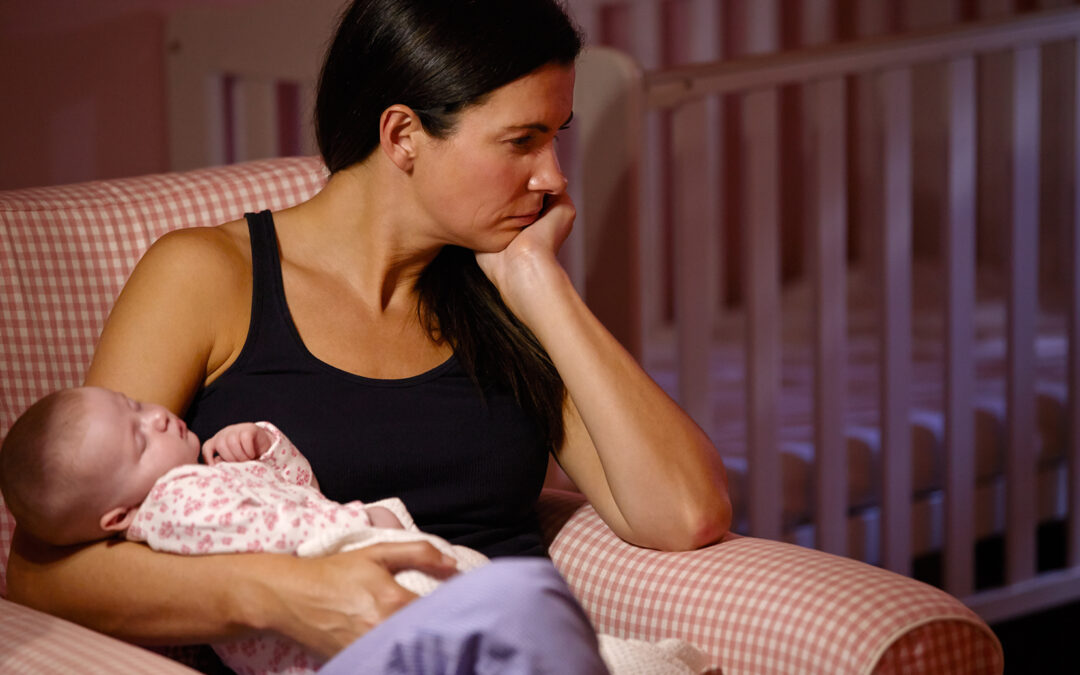
by North Shore Child & Family Guidance Center | Jan 11, 2024 | Blog
While the holidays are synonymous with joy, togetherness, and celebration, the period that follows can prove to be anything but. As the boxes of decorations are moved back into the attic, it’s not uncommon for complex emotions to take over. The phenomenon known as “post-holiday blues” takes place when the chaos of the holidays has come to an end, leaving behind feelings of emptiness, anxiety, and frustration. This slump can have particular effects on mothers, who often take the lead on holiday planning and are therefore more susceptible to the highs and lows of the holiday season and beyond.
The post-holiday blues share many characteristics of anxiety and mood disorders. Sadness, loneliness, anxiety, insomnia, and disappointment are common traits, and are often confined to the winter months.
Emotional labor, expectations, and repression
Mothers often bear the brunt of emotional labor during the holidays. According to research done by the American Psychological Association, women are more likely than men to report an increase of stress during the holiday season, citing lack of time, lack of money, and pressure to give presents as primary stressors. The pressure to buy the perfect gifts, decorate the home, and prepare elaborate meals can be emotionally taxing, and mothers will frequently spend weeks planning, organizing, and ensuring that everyone in the family has a memorable and magical experience.
Social media has contributed to an unrealistic set of expectations surrounding the holiday season. As we scroll through countless posts of elaborately decorated houses and piles of perfectly wrapped presents, it’s easy to find ourselves comparing our holiday celebrations to those of others. Many mothers feel responsible to create a picture-perfect holiday atmosphere for their families, and often face a sense of letdown if they fail to meet these expectations.
The period of Thanksgiving through New Year’s is a chaotic time, and busy parents frequently spend every spare moment focused preparing for celebrations. With so much time and energy focused on others, it is easy to neglect your own mental wellbeing, pushing any negative emotions aside in order to focus on the long list of things that need to get done. January brings time to catch your breath and reflect, leading to weeks of emotions bubbling to the surface. These repressed feelings will be difficult to handle all at once, and will result feeling overwhelmed and burned out.
Manage the post-holiday blues
The post-holiday blues don’t have to be inevitable. Be sure to set boundaries with family and friends in order to avoid stretching yourself too thin, and reach out for help before you begin to feel overwhelmed. If symptoms have already set in, take time to yourself and focus on self-care. Prioritizing things that make you happy are key in escaping the feelings of loneliness and isolation that are all too frequently associated with the winter months. Focus on eating well, exercising, and staying mentally stimulated. Most importantly, be gentle with yourself and remember that, even if the holidays didn’t go as planned, you are still a great mother.
If you are a new mom and worried about how you are feeling, don’t be afraid to reach out for help. Contact the North Shore Child and Family Guidance Center at (516) 626-1971 to get the necessary support you need.

by North Shore Child & Family Guidance Center | Dec 28, 2023 | Ask The Guidance Center Experts, Blog
In this monthly column, therapists from North Shore Child & Family Guidance Center answer your questions on issues related to parenting, mental health and children’s well-being. To submit a question, email communications@northshorechildguidance.org.
Question: With the New Year approaching, my daughter comes home from school every day with a different resolution she declares she wants to stick to. I love that she has goals she wants to accomplish, but I want to make sure she isn’t overwhelming herself with too many expectations. How can I help her manage her long list of New Year’s Resolutions, and support her in sticking to the ones she finds important?
-Realizing Realistic Resolutions
Dear Realizing Realistic Resolutions,
As we approach the New Year, many of us are familiar with the enthusiasm our children bring home, declaring a myriad of resolutions they want to accomplish when the clock strikes midnight. It isn’t uncommon for children to overload themselves with things they would like to achieve, widely ranging from eating healthy to becoming the President. Kids need to feel a sense of mastery, and having an abundance of resolutions may make that difficult.
Support is integral in helping kids stay committed to their resolutions. It’s important to begin the conversation by expressing how proud you are of her desire to make choices that will positively impact her and foster an environment of open communication on her journey. Sit down with your child and go over the list together, picking out one or two objectives that are particularly meaningful and realistically achievable. Work together to create a reasonable timeline and break down the goals into smaller, actionable steps. Be sure to celebrate the progress along the way, making the experience enjoyable and enriching for your family. Does she want to be at the top of her class this year? Explain how often she’ll have to study to make that happen and celebrate every A on a test she brings home.
Watch out for signs that your child is overwhelmed, stressed, or frustrated. If she is falling short of her goals and expresses feelings of inadequacy, it’s essential to reassess the situation. This should be an enjoyable experience, so remind your daughter that setbacks are a natural part of growth, and that she can always adjust her resolutions to become more manageable. Always prioritize progress over perfection!
Lastly, encourage making positive changes all year long, not just on New Year’s Day. There is never a bad time to start a goal, and pushing it off until January 1st can make the task more daunting. This goes for adults, too! How often do you wait until the new year to get back into the gym instead of signing up for the membership then and there? New Year’s resolutions can be a great source of motivation, but remember that it’s up to you to make a change in your life, not a date on the calendar.
As the preeminent not-for-profit children’s mental health agency on Long Island, North Shore Child & Family Guidance Center is dedicated to restoring and strengthening the emotional well-being of children (from birth – age 24) and their families. For 70 years, the Guidance Center has been a place of hope and healing, providing innovative and compassionate treatment to all who enter our doors, regardless of their ability to pay. For more information about the Guidance Center, visit www.northshorechildguidance.org or call (516) 626-1971.

by North Shore Child & Family Guidance Center | Dec 26, 2023 | Blog
It’s the most wonderful time of the year, meant to give us the opportunity to reflect on family, tradition, resolutions and… budgets. The holiday season is characterized primarily by wish lists and last-minute shopping, straying further away from the interconnectedness we all aim for during the winter holidays. When every advertisement is aimed towards getting our children the hottest new toy, kids are led to wonder less about what family members they’ll be seeing and focus more on which presents they’ll be receiving. How do we break out of this cycle? By teaching our kids the gift of gratitude.
Give to the community
Encouraging children to give back to the less fortunate members of their community can allow them to appreciate their privileges more. Suggest that, instead of asking for a toy or game, they put the money towards helping other children. Volunteering at a soup kitchen during the holidays is a great way to bond with your family while connecting to the community. Sit down with your children and figure out what causes they find meaningful, whether it be mental health, fighting hunger, supporting animal shelters, or anything in between. A collaborative conversation with the whole family will show your children the value of a dollar and allow them to realize that the best present isn’t receiving, but giving.
Watch out for overconsumption
Thanks to the advent of two-day shipping and online-only deals, shopping couldn’t be more convenient. This often leads to making purchases on things we have no real need for, simply because it’s accessible. When children see packages arriving on the doorstep multiple times a week, they learn to view spending money on material items as inconsequential and commonplace, even learning to expect new items on a regular basis.
It can be tempting to spoil your children, especially during the holidays. While there’s nothing wrong with showing love through treats and toys, try to avoid getting everything on their wish lists. Instead, begin to teach your child financial literacy and help them determine the difference between gifts that are wants and needs.
In order to keep overconsumption in the household in check during the holidays, it’s important to show kids how to decide if you really need something before purchasing it. Adopt the one in, one out method: if your child asks for a new toy or video game, explain that in order to make room for a new item, another item will get donated to charity. If they aren’t willing to part with any of their old toys or clothes, they probably don’t need something new.
Write thank you letters
Writing thank you letters during the holidays is a great way to practice gratitude. Whether addressing them to family, friends, teachers, or bus drivers, a handwritten letter is a touching way to show your love and appreciation for a person. In a fast-paced world, writing letters is a personal way to teach children to slow down and reflect on all the support and generosity they are given in their day-to-day lives.
Teaching your child the gift of gratitude is an invaluable lesson that will strengthen their relationships with family, community, and themselves for the rest of their lives. As they grow to place less of a value on receiving presents and more on spreading joy and generosity, children and families will be able to appreciate the holiday season in a rewarding and fulfilling way.

by North Shore Child & Family Guidance Center | Dec 15, 2023 | Blog
The holiday season is often characterized by joy, festivities, and the warmth of family gatherings. However, for those in the role of caretaker to a loved one living with addiction, this time of year brings unique challenges that can be hard to navigate. While others celebrate, caregivers find themselves grappling with the dynamics of addiction, looking to foster compassion and hope during a time that can be trying for both the person in recovery and those aiding in their journey. As difficult as it can be, there are things you can do to make the holidays easier on you and your family.
Lessen the importance of alcohol at your function
Binge drinking is a common occurrence during any major holiday, as it’s easy to let things get out of control during a celebration. If someone with addictive behaviors is attending your function, try to de-emphasize the importance of alcohol. For some, this may mean not offering any alcoholic beverages throughout the night. For others, a variety of mocktails alongside the wine selection will make your loved one feel included without being too tempted to compromise their progress.
Keep to your usual routine
Though it can be tricky to upkeep during the holidays, a structured routine is vital when caregiving for a person struggling with addiction. Sticking to a schedule can lessen the feeling of being out of control during the holiday season, reinforcing a sense of normalcy.
Things like holiday traveling, shopping, and cooking can throw off set schedules. Make life easier on yourself and your loved one by setting alarms, meal-prepping, and choosing to stay local for the holidays.
Manage triggers and anxiety
Whether your loved one is in active addiction or recovery, it is important to understand things that trigger them in order to make family gatherings successful. 1 in 5 people with anxiety report turning to alcohol or substance use in order to cope with stress, so attempting to reduce any major triggers is key in staying on track.
Open communication is integral when managing stressors of any kind, so don’t be afraid to have hard conversations during the holidays. You may want to talk with other family members about conversation topics that are off-limits. Perhaps questions about job hunting or romantic partners are sources of anxiety for the person struggling with addiction; suggest that these inquiries are directed at others or avoided altogether.
Take care of yourself first
When caregiving for someone struggling with addiction, it’s natural to want to devote all your energy towards aiding in their recovery. However, neglecting your own needs will inevitably lead to burnout and exhaustion, impacting your ability to offer effective help to your loved one. Taking care of yourself first involves setting boundaries, both emotional and physical, to protect your mental health. Ensure you make time for self-care activities, whether it’s engaging in hobbies, seeking support from friends and family, or just taking short breaks to recharge. Remember that you are allowed to enjoy the holidays, even if a person close to you is struggling. You are not responsible for the actions of the addicted person, and it is not your problem to fix alone.
Addiction is a challenging journey, and you can only offer meaningful help when you are in a stable and healthy state yourself. In prioritizing your well-being, you position yourself to be a more resilient and supportive caregiver in the long run.
Always remember
The holiday season can be an especially challenging time for those in the role of caregiver for individuals struggling with addiction. The demands of the holidays, coupled with the complexities of managing another’s substance abuse, can create a unique set of stressors. By fostering open communication, setting boundaries, and maintaining routines, caregivers can navigate the holiday season with resilience and provide the vital support your loved ones need.

by North Shore Child & Family Guidance Center | Dec 8, 2023 | Blog
By Guest Blogger Colleen Stewart
Being a parent is tons of work, so it can be easy to get overwhelmed. After all, there is a seemingly never-ending list of things to do with limited hours in a day. Thankfully, there are many cost-effective ways to stay organized as a parent, even if you have multiple kids, work full-time, and struggle to keep your home neat and tidy.
The Importance of Staying Organized
Keeping your home clean can help reduce stress and strain in many ways. According to Hope Mental Health, clutter makes you focus on things that aren’t important, taking attention away from where it’s most needed. Being disorganized can greatly reduce productivity, and we all know how it feels to get so far behind that we don’t know what the next step should be.
Tips On Staying Organized
Go Digital
Keeping digital copies of medical, school, and other records can be a lifesaver for parents. Saving these documents as PDFs makes it easier to send them to anyone who needs access to your children’s histories, such as doctors’ offices and schools. PDFs can be viewed on any device and don’t require a special operating system. There are many free PDF tools online that allow you to edit, sort, rotate, and convert your documents.
Create a Family Command Center
A family command center is a space where everyone in the house can check to find out what they have to do for the week. It could be in physical form, such as a wall calendar or bulletin board, or you could utilize your smart technology to create a list for everyone in your home.
Purge the Unnecessary
Clutter is a major cause of stress, and the best way to get rid of clutter is to donate or sell things that you no longer need. These items can be given a new life in another family, and they won’t take up space and collect dust on your shelves. The Zebra Blog offers a list of worthwhile charities to consider.
Save Time Using Meal Planning and Bulk Buying
Meal planning and bulk buying groceries are effective strategies for parents to maintain organization in their busy lives. By planning meals in advance, parents can streamline their grocery shopping, ensuring they buy only what is necessary, thus reducing waste and saving time. Bulk buying frequently used items minimizes the need for frequent shopping trips, allowing for better management of time and resources. This approach also aids in budget control, as buying in bulk often comes with savings. Furthermore, meal planning ensures a balanced diet for the family, reducing the stress of last-minute meal decisions and promoting healthier eating habits.
Other Tips
● Be creative. There is no hard and fast set of rules when it comes to being organized. The most important thing is to find a system that works for you and your family. Come up with solutions that fit your lifestyle and budget.
● Change things up. If you find that an organizational system doesn’t work, don’t be shy about changing things up. It’s okay to change course and try something new!
● Streamline your morning routine. If you have kids, your morning routine is likely hectic. By streamlining things, mornings will become that much easier for everyone in the house. Consider using a closet hanging organizer to put several days’ worth of outfits together, so that no one ever has to wonder what they’re going to wear to school, packing lunches the night before, and having backpacks set out at the front door.
Being a parent on a budget means you have to get creative in all aspects of life, and being organized is no exception. Today’s tips, from digitizing your documents to purging your home of clutter, can all help you reduce the stress caused by disorganization.
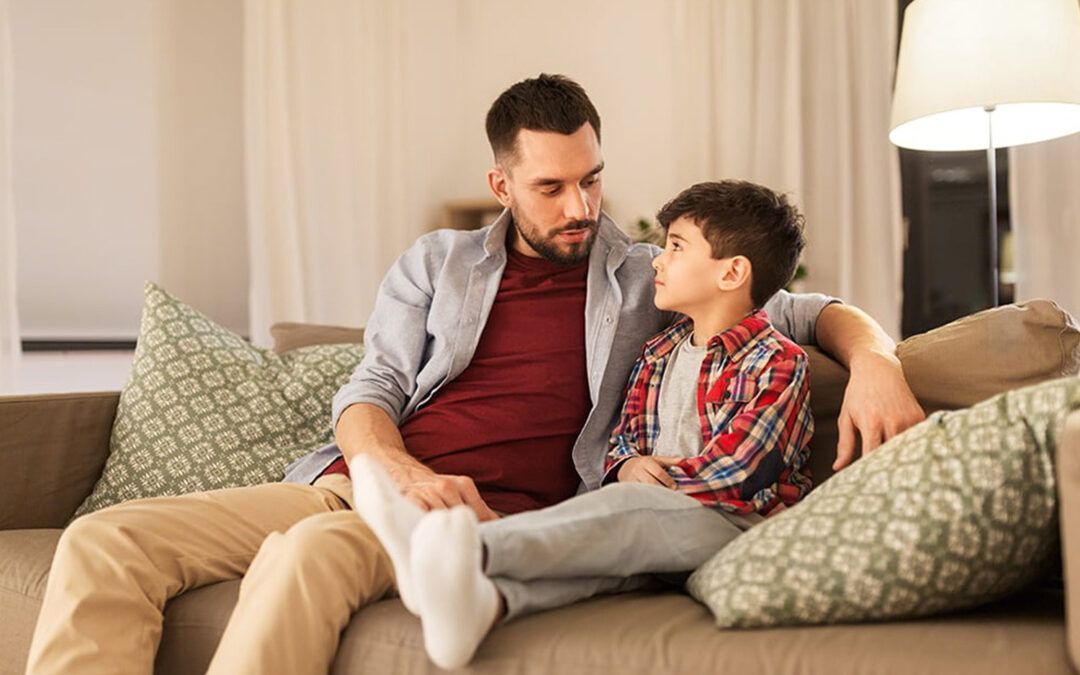
by North Shore Child & Family Guidance Center | Dec 1, 2023 | Anton Media, Blog, In The Media
By Kathy Rivera, Executive Director/CEO, North Shore Child & Family Guidance Center
Children are always listening, even to things they may not have the ability to fully comprehend. Whether it be from social media, school, or adults in their lives, it’s inevitable that kids are hearing about the many tragedies that are occurring throughout the world today. Though a parent’s first instinct may be to shield their child from the anxiety and fear that comes with the unknown, avoiding the topic could leave their child feeling lost and helpless.
Discussing challenging world events with your children is a delicate but necessary task. By fostering trust, maintaining composure, promoting open communication, addressing social media influence, and helping children cope with anxiety, you can guide them through the complexities of the world while providing them with a safe and supportive environment. These conversations should be ongoing and adapted to your child’s age and maturity level as they grow and develop.
A foundation of trust
Children need to know that they can rely on their parents through hard times. It’s important to have a strong foundation of trust before going into any difficult conversation with your child. So, what’s the best way to do this? Dr. Sue Cohen, Director of Early Childhood and Psychological Services at North Shore Child & Family Guidance Center, highlights the importance of actively listening to your children. By paying attention to what they say, encouraging family conversations, and demonstrating mutual respect, you can build a strong foundation of trust. This is vital in helping your children navigate complex issues and challenges in the world.
Remain calm
Before explaining the news to children, it’s essential for parents to come to terms with it themselves. Kids are adept at picking up on adult emotions, often feeling affected by the stress, anger, and anxiety of their caregivers, so remaining composed while approaching the topic is crucial for effective communication. “Children feed into their parents’ tone, so if they give the information in a calm manner, children will know that they’re safe,” says Dr. Cohen.
Open communication
Parents should strive to understand what their children already know to gauge their exposure to external information. Get a sense of their awareness and correct any misinformation they may have encountered. Allow them to ask questions without judgment and answer them in an age-appropriate manner. For younger kids, assure them that the scary events are happening far away and that they are safe. For older children, stress the importance of finding reliable information on current events and knowing when to look away from the news.
Addressing social media
With the rise of technology and social media, kids today have unfiltered access to events happening anywhere in the world. What once could only be viewed on the nightly news or in the morning paper is now at our children’s fingertips 24/7. It is important to explain to tweens and teenagers the realities of social media. Anyone can have a platform on sites like TikTok and Instagram, which means that not everything they see is backed up by facts. Media literacy is taught in some schools, but it’s important to continue those lessons at home. Discuss the importance of finding primary sources, understanding biases, and recognizing historical context.
Dealing with anxiety
Exposure to tragic events can significantly increase anxiety levels in children, impacting their daily routine, sleep schedules, and eating habits. Dr. Cohen emphasizes the importance of maintaining regular routines, as children thrive on consistency. Encourage children to express their feelings through creative outlets like artwork and music, or by seeking support from a youth group or volunteer service. Staying mentally and physically active can significantly impact how children cope with distressing news.
Remember that support is there for your families as we all navigate this difficult time. Contact the North Shore Child & Family Guidance Center at 516-626-1971 if you or a loved one are struggling.

by North Shore Child & Family Guidance Center | Nov 20, 2023 | Blog
The holiday season is rapidly approaching, bringing with it countless expectations of family connection, laughter, gratitude, and joy. When these idyllic visions fall short, mental health often worsens, leading many to turn to alcohol and substance use to cope. As we gather around the table to give thanks, it’s equally important to understand the link between Thanksgiving and alcohol abuse, and what we can do to prioritize well-being during the holidays.
Why do the holidays serve as triggers for alcohol and substance use?
According to NAMI, 64% of individuals living with a mental illness report that the holidays make their conditions worse, often due to the increased amount of stress the holiday season brings. People tend to feel more anxious during this time for a variety of reasons: the holiday blues and seasonal affective disorder; the pressure of gift giving and overspending; unhealthy family dynamics; and much more. Studies suggest that people experiencing high stress levels have a greater likelihood of using alcohol or substances to forget their worries. These factors, combined with the culture surrounding alcohol during the holiday season, leads to an increased risk in the urge to over consume or relapse.
Setting boundaries
Rates of binge drinking increase during every holiday, but Thanksgiving is known to be among the worst offenders. The day before Thanksgiving has even earned the nickname “Blackout Wednesday,” as it is one of the most popular days for bars in America, even rivaling St. Patrick’s Day. For those suffering with alcohol and substance use issues, Thanksgiving can prove to be a major trigger. Family members that don’t understand sobriety may encourage a drink with dinner, thinking that “just one won’t hurt.” For some, even being in the same room as alcohol can be enough to compromise progress.
In these situations, it is important to set boundaries and communicate with your family. Here are some ways you can express your intentions and stick to them at your holiday dinner.
● Host Thanksgiving yourself. Your house, your rules. By hosting, you can ensure alcohol will not be on the menu.
● Let people know ahead of time that you aren’t drinking. If you feel comfortable sharing your sobriety journey with select family members, explain how important it is that you aren’t offered alcohol.
● Be the designated driver. Giving yourself the responsibility of driving someone else home at night will further motivate you to refrain from drinking.
● Have a non-alcoholic drink in your hand at all times. Consider bringing an alcohol-free beer, wine, or juice to sip on throughout the night. Holding a beverage can deter people from offering you something alcoholic to drink, and will help lessen feelings of missing out.
● Stay busy. Offer to help with the cooking, cleaning, and serving throughout Thanksgiving dinner. This can help to keep your mind distracted and away from thoughts of alcohol and anxiety.
As the holidays draw near, it’s important to value the things we should be most grateful for: our well-being, and that of our loved ones. Understanding the triggers for overconsumption or relapse & knowing when and how to set boundaries are integral in maintaining a healthy lifestyle during the season of gratitude. If you or a loved one show signs of alcohol and substance use, call the Guidance Center at (516) 626-1971 or click here to get connected to our drug and alcohol treatment and prevention services. It is never too late to turn hurting into healing
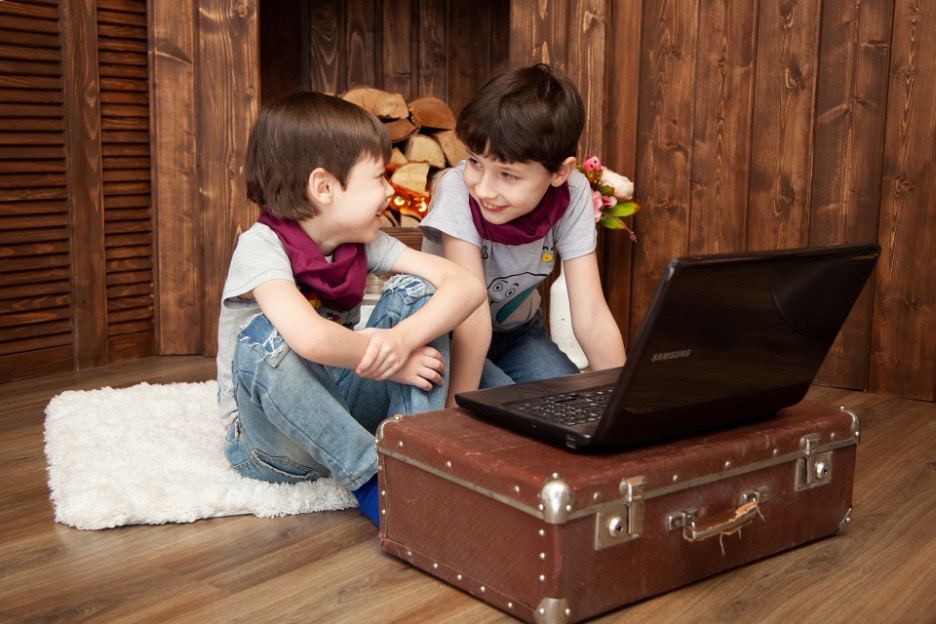
by North Shore Child & Family Guidance Center | Sep 7, 2023 | Blog
By Guest Blogger Ronnie Salazar
Children’s mental wellness plays a pivotal role in their overall development and happiness. As young minds navigate the challenges of growing up, it is essential to prioritize their emotional and psychological well-being. A solid foundation of mental wellness not only fosters resilience but also contributes to better academic performance, healthier relationships, and a positive outlook on life.
In today’s digital age, children are exposed to various technological devices and platforms. However, these digital tools can also serve as a powerful medium for nurturing kids’ mental wellness. Digital creativity, encompassing various forms of artistic expression such as digital art, music, storytelling, and video editing, can provide a safe and constructive outlet for children to explore their emotions, build self-esteem, and cope with stress.
The Power of Digital Creativity for Kids
Expressive Outlets for Emotional Release
Digital creativity offers children a unique platform to express their thoughts, feelings, and emotions in a safe and non-judgmental environment. Kids can channel their innermost emotions, allowing them to process complex feelings and experiences. Whether they create digital paintings, compose music or edit videos, these outlets enable children to communicate and cope with emotions they might find challenging to express verbally.
Boosting Self-Esteem and Confidence
As kids witness the results of their creative efforts, whether it’s a captivating piece of digital art or a self-edited video, their sense of achievement grows, boosting their self-esteem and confidence. Positive feedback from peers, family, and teachers further reinforces their belief in their abilities, contributing to a solid and healthy self-image.
Stress-Relief and Relaxation through Creativity
When immersed in creative activities, the mind focuses on the task at hand, diverting attention from daily stressors. Whether it’s composing a soothing piece of music, engaging in digital storytelling, or experimenting with art, these creative pursuits can become a form of mindfulness, promoting a sense of calm and relaxation in young minds.
Exploring Digital Art and Video Editing
Digital Drawing and Painting for Self-Expression
Digital drawing and painting provide an exciting and accessible medium for kids to express themselves artistically. With a wide range of digital tools and software available, children can unleash their creativity through vibrant colors, imaginative compositions, and intricate details. This form of self-expression allows them to communicate their thoughts and emotions visually, enabling a deeper understanding of their inner world. Digital art also encourages experimentation and the freedom to undo and redo, empowering children to explore and refine their ideas without fear of mistakes.
Video Editing as a Creative Outlet
Video editing opens up a world of storytelling possibilities for kids. By piecing together clips, adding effects, and incorporating music, children can create their narratives, documentaries, or artistic pieces. Video editing allows them to explore their storytelling abilities and perspective, giving them a sense of authorship over their creations. Whether they capture real-life events or conjure up fantastical scenarios, video editing provides a means for kids to share their ideas and perspectives with others, fostering a sense of connection and communication through visual storytelling.
Music and Sound Creativity
Digital Music Tools for Kids
From user-friendly apps to virtual instruments, children can explore the world of music composition and production in exciting ways. These digital music tools often offer pre-made loops, easy-to-use interfaces, and interactive tutorials that allow kids to experiment with melodies, rhythms, and harmonies. Engaging with digital music tools empowers children to create their musical pieces, fostering a sense of accomplishment and creativity. You can try Virtual Drumming or Song Smith app.
Benefits of Music for Kids’ Emotional Wellbeing
Music holds a profound impact on children’s emotional well-being. Engaging in music and sound creativity can be a cathartic outlet for emotions, enabling kids to express themselves in ways they might not be able to with words alone. Whether playing an instrument, composing music, or using digital sound effects, children experience a range of emotions, from joy and excitement to introspection and comfort. Music has the power to evoke powerful emotions and memories, offering solace during challenging times and enhancing positive emotions during happier moments.
Interactive Storytelling and Writing
Digital Platforms for Storytelling
Interactive digital platforms now offer immersive and engaging storytelling experiences that go beyond traditional books. These platforms incorporate elements like animations, sound effects, and interactive choices, allowing children to actively participate in the narrative. Through e-books, interactive apps, and online storytelling communities, kids can explore a vast array of stories tailored to their interests, sparking their creativity and curiosity.
Fostering Imagination and Empathy through Stories
As they embark on virtual adventures and make decisions that shape the storyline, children are encouraged to think critically, solve problems, and envision new possibilities. Moreover, exposure to diverse characters and perspectives in stories helps kids develop empathy and understanding of others’ experiences. By immersing themselves in these interactive narratives, children can develop emotional intelligence, empathy, and a profound appreciation for the power of storytelling in connecting hearts and minds.
Overcoming Challenges and Concerns
Addressing Cyberbullying and Online Safety
Parents and educators should educate kids about the importance of responsible online behavior and how to recognize and report cyberbullying incidents. Creating an open and supportive environment where children feel comfortable sharing their online experiences can help identify and address any issues promptly. Implementing parental controls and monitoring tools can also provide an added layer of protection, ensuring kids’ safety while exploring the digital world.
Balancing Screen Time with Offline Activities
While digital creativity offers numerous benefits, excessive screen time can lead to various challenges, such as sleep disturbances and reduced physical activity. Encouraging kids to participate in offline activities, such as sports, reading, or spending time with family and friends, helps foster a well-rounded lifestyle. Setting clear boundaries and designating tech-free periods can promote healthier screen habits and ensure that digital creativity complements, rather than substitutes, other valuable aspects of their lives.
Conclusion
Digital creativity offers children a myriad of benefits, from providing expressive outlets for emotional release through digital art and video editing to fostering self-esteem and confidence. Engaging in music and sound creativity allows children to connect with their emotions and experience the therapeutic effects of creative expression. While navigating the digital landscape, addressing concerns like cyberbullying and balancing screen time is crucial for ensuring a safe and well-rounded experience.

by North Shore Child & Family Guidance Center | Aug 10, 2023 | Blog
By Guest Blogger Chloe Cohen
As the need for mental health services for youth becomes increasingly necessary, with 21.8% of children diagnosed with one or more of the common mental health conditions, it’s vital to highlight the voices of those being affected: the children. Recent studies and institutionalized changes surrounding the mental wellbeing of children can be largely attributed to the speaking out of young people and normalization of seeking help.
It can be questioned why diagnosis statistics are at a steady incline. It remains true that it may be virtually impossible to pinpoint the exact causal pathway to one rooted issue as mental disorders are largely multifactorial. Despite this, it is important to listen to the children impacted in order to make advancements in our systems and resources.
Combating the Stigma: How Generation Z Views Mental Health
In a study focused on the generational differences in mental health, Deloitte found that in terms of holistic health priorities, the leading concern for Generation Z is mental health with physical health following in second. This is a drastic difference to the older generations who majorly don’t consider mental illness to be a “health” problem – Mental Health America found that only 38% of adults 65 and older believe depression to be a health issue. The stigma surrounding mental health has been a prominent setback towards advancements in treatment for years. Generation Z, myself included in this demographic, has taken this matter into our own hands in consistently spreading awareness and further, advocating for the need for accessible treatment and resources.
Despite more frequent mental health conversations, the gap between prevalence and treatment is still vast so it’s crucial to listen to the youth’s recommendations on what they believe will combat these struggles.
So, What Should Be Done?
New York State has taken notice of the youth’s call to action and began to dig deeper at what can be done for these issues. Governor Hochul invested a striking $1 billion in youth mental health studies to address the CDC instated mental health crisis among youth. The premise of the study was to collect feedback from children all over NYS with a focus on what types of programs and advice youth could envision de-escalating the crisis.
According to the June 2023 published Youth Mental Health Listening Tour Report, here are some key youth recommendations from the study:
● Involving young people in decision making/ mental health program design
● Hiring diverse health professionals that can relate to a variety of students
● Increase amount of youth led programs
● Educate adults on how to support young people, listen without judgment, and establish clear lines of confidentiality
● Invest in social and recreational activities to promote mental wellness
It’s the duty of the professionals and NYS to hear these results and put them into action. Now, where does The Guidance Center fall into this?
The Guidance Center is Here to Help
North Shore Child & Family Guidance Center emphasizes compassion and innovative treatments for children from birth to 24 years old. Our staff across all three locations contains a wide range of diverse individuals with an array of experiences in order to optimize the relatability and relationships between therapist and client, as is an important factor in mental health care according to the report. Additionally, The Guidance Center provides a number of programs and services to support the youth in the way that they need to be supported. Each client is comprehensively evaluated, tailored to an individual treatment plan that may include any combination of individual, family, and group therapy, and if needed, medication management.
As an intern in The Guidance Center, I have had the privilege of learning about our programs and closely working with the staff that make it all happen. I can say with confidence that The Guidance Center not only provides services that accommodate these youth recommendations, but the staff as a whole is truly dedicated to ensuring the mental wellbeing of our youth. Outside of therapy, The Guidance Center offers programs such as the Wilderness Respite Program that hosts children from any mental health facility to come together and participate in adventurous activities as a gateway to mastery of social skills and youth empowerment. The Guidance Center also offers programs such as the LGBTQ+ & Latina Girls Project that bring together clients who may be in need of extra support from those who have similar experiences.
Our staff is specially trained for working with children and their families with no limits or restrictions to provide our clients with the care they need. A major setback to children receiving services is financial limitations. At The Guidance Center, we are dedicated to reaching everybody who needs us. As said by Executive Director/CEO, Kathy Rivera, “We turn no one away for any inability to pay… We are committed to equity in mental health regardless of what your ZIP code is, what your bank account looks like. Everyone deserves to have access to care.” The Guidance Center is a place where youth heal and thrive accessibly and affordably as we stay up to date with changing times and individually molded treatment plans.
If you or your child is in need of support, know that we are here to help! Call us at (516) 626-1971 to learn more about our services or make an appointment today.
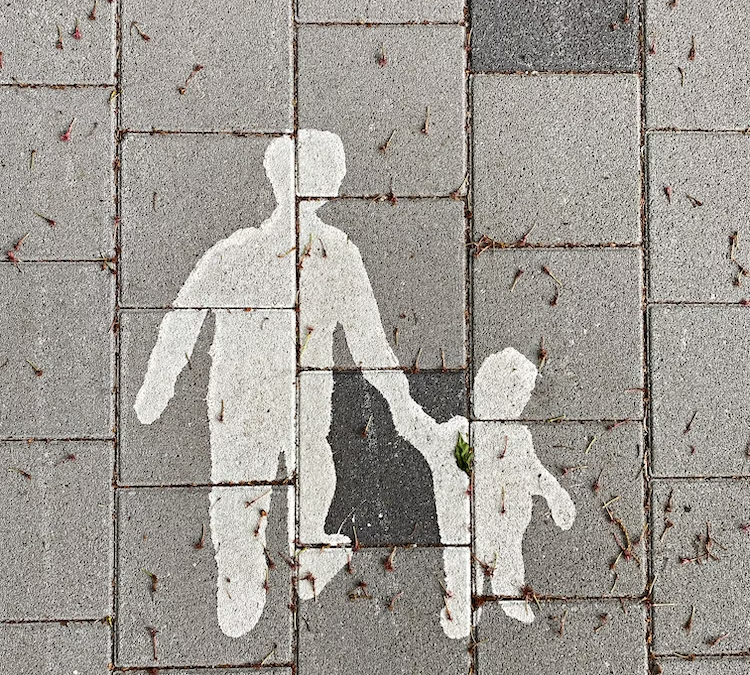
by North Shore Child & Family Guidance Center | Jul 6, 2023 | Blog
Guest Blog By Emily Graham
About 1 in 11 children in the US live with a parent who has a substance addiction problem, reports the National Library of Medicine. This is a worrying statistic – such kids tend to have turbulent lives and many mental health challenges. The addicted parent may demonstrate an extreme spectrum of behavior to the child, ranging from healthy caring to outright abuse, leaving the child feeling confused, anxious, angry, traumatized, and unstable.
Understanding that the erratic behavior is a result of the parent’s substance addiction can help the child come to terms with the situation. It gives them insight into the “why”, that it’s not their fault, and helps them gain more mental peace. Furthermore, if the child is of suitable age, it can help the child practically assist the parent.
Technology can be an invaluable asset in giving the child insight into addiction (and related behavior). Below, North Shore Child & Family Guidance Centerexplains how.
Access to educational resources
First and foremost, technology provides children with easy access to helpful educational resources covering addiction. The child can conveniently read articles, watch videos, and check other resources from their smartphones or computers. Much of this material is explained simply, in a way even young kids would understand. Moreover, children can have pressing questions answered directly by experts. The Hazelden Betty Ford Foundation offers free educational resources for kids.
Support counseling
A parent’s addiction can be hard for the child to witness. Sometimes, if the parent is abusive, it affects them directly. With technology like video conferencing and Chatbots, kids can quickly connect to qualified therapists and other trained mental health professionals. Said experts can help the child make sense of their parent’s behavior and provide emotional and mental support. If you’re a child or young adult looking for such support, reach out to North Shore Child & Family Guidance Center.
Virtual participation in support groups
Support groups provide multiple benefits – an avenue to express your feelings, access to helpful information, access to people in similar situations, increased self-understanding, and anxiety relief. Children can’t always join support groups in the real world, for various reasons. With technology, kids can join virtual support groups (including forums, social media groups, chat groups, and more).
Communicating with parents struggling with addiction
Sometimes the parent struggling with addiction may not be physically present for the child. In such cases, messaging and video conferencing apps allow the parent to communicate with the child remotely. Instead of having the other parent (or a stranger) explain the reasons for the absence, the struggling parent could do so in person, which is better for everyone involved.
Second or third-hand experience
Understanding addiction is easier if you witness the effects personally or hear stories from people who are struggling with a substance abuse disorder. There are several apps out there – like AA Big Book and Sober Grid – that provide kids with second or third-hand experiences from people suffering from addiction or their loved ones. The AA Big Book app, for example, is full of personal stories, prayers, and how-to guides revolving around addiction.
Role reversal: Helping the addicted parent
Sometimes, the child looks after the parent instead of the other way around. This role reversal is, unfortunately, frequent in families where one or both parents suffers from an addiction. Technology can provide the child access to helpful resources on addiction treatment and recovery, not to mention get direct assistance from qualified experts for their parents. For instance, technology can raise awareness of and provides access to addiction recovery facilities that can help beat addiction.
Conclusion
Understanding the problem is an important first step in managing it. When the child understands the parent’s addiction – including the causes and symptoms – they know not to take it personally. It can help them gain more mental peace and inner stability. In many, it can help the child assist the parent in recovering. Technology can both facilitate said understanding and act as useful support when the child wants to help the parent recover.

by North Shore Child & Family Guidance Center | Feb 27, 2023 | Blog
By Dr. Nellie-Taylor Walthrust
Getting a driver’s license is a rite of passage that teenagers have been celebrating since the early days of automobiles. Driving makes teens feel more independent than ever before, and it can also provide a break for parents, who spend a great deal of their time carting their kids back and forth from practices and other activities.
But the celebration of this newfound freedom necessitates a crucial conversation and the drawing of a line in the sand: Let them know that driving while using alcohol, marijuana or any other substances is forbidden, and start having these conversations when they are young.
With marijuana use now legal for people 21 years of age and older, your kids may be of the mindset that it’s not a big deal. That’s far from the truth. It’s illegal to drive while under the influence of alcohol and weed or other drugs. According to the NY State Governor’s Traffic Safety Committee, driving under the influence of marijuana subjects you to the same penalties as driving under the influence of alcohol.
And there’s good reason: Marijuana impacts areas of the brain that control perception, balance, coordination, memory and judgment. It can slow reaction times, decrease attention and make it difficult to follow the road and stay in your lane.
We know you don’t want your kids to use marijuana or alcohol, period. But the reality is that many of them do. Having the conversation about safety and driving will not make them any more likely to experiment – in fact, it might have the opposite effect.
Here are some sobering statistics:
- 23% of teens admit they have driven under the influence of alcohol, prescription drugs or marijuana.
- Teen drivers 16-19 have a fatal crash rate almost three times as high as drivers ages 20 and older.
- The percent of crash deaths involving cannabis more than doubled from 9% in 2000 to 21.5% in 2018.
- 24% of teens reported that within the previous month, they had been a passenger in a car with a driver who had been drinking alcohol or using drugs.
As a parent, what can you do to minimize the risks?
The Centers for Disease Control and Prevention suggests creating a Parent-Teen Driving Agreement that clearly sets expectations and limits. Sit with your teen and write down the hazards of driving while impaired and the consequences for breaking the rules. Put it on your refrigerator and update it as your teen gains experience and more driving privileges. (Visit cdc.gov for a sample agreement.)
If your teen plans to go to a party, make sure you talk to the parents where the festivities are being held. Ask if there will be supervision and if alcohol is being served—and if your teens are under 21, the answer should be a resounding no.
Despite taking all precautions, your teens may find themselves in a situation where they are being pressured to drink or use drugs. Tell them that you will be willing and able to get them at any time during the night—and that if they or their friends have been drinking or using drugs, they should contact you for a ride.
As parents, we must do all we can to educate our kids about the dangers of driving while impaired, but we also need to face the reality that even “good” kids can start heading down a dangerous path. Keep the lines of communication open, and if you suspect there may be a problem, consider contacting a professional who is trained in alcohol and substance use.
Bottom line: Let your teen know that driving requires their full attention, so marijuana, alcohol or any kind of substances are not allowed – and that means no texting, too!
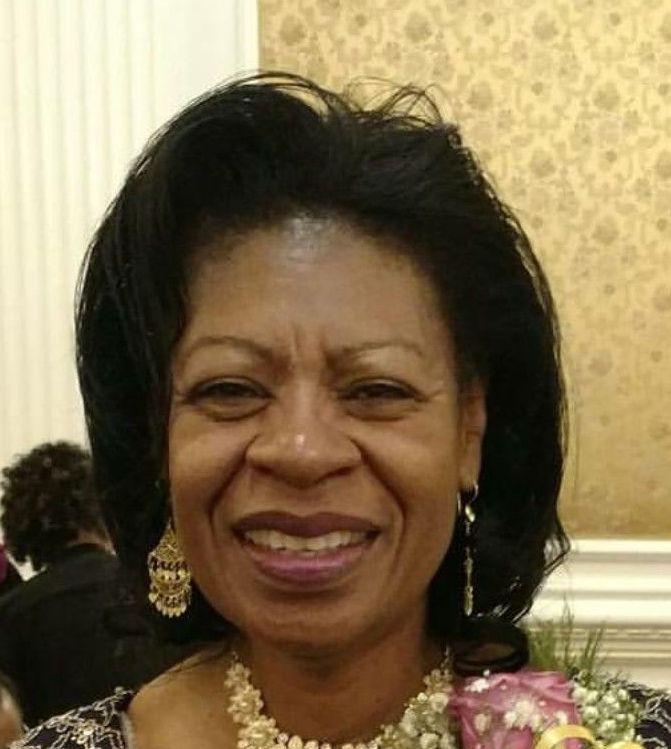 Dr. Nellie Taylor-Walthrust is the Director of at North Shore Child & Family Guidance Center’s Leeds Place, which operates an Adolescent Outpatient Chemical Dependency Treatment Program. Substance use services include counseling youths who are alcohol and drug abusers, children who live in families with a parent who is suffering from alcoholism or drug addiction and youths who have co-occurring chemical dependency and mental health problems. Prevention services are offered to local school districts. Call (516) 626-1971 to learn more.
Dr. Nellie Taylor-Walthrust is the Director of at North Shore Child & Family Guidance Center’s Leeds Place, which operates an Adolescent Outpatient Chemical Dependency Treatment Program. Substance use services include counseling youths who are alcohol and drug abusers, children who live in families with a parent who is suffering from alcoholism or drug addiction and youths who have co-occurring chemical dependency and mental health problems. Prevention services are offered to local school districts. Call (516) 626-1971 to learn more.
Photo credit (for the driving photo): Adobe Stock, By Habitante Stock

by North Shore Child & Family Guidance Center | Feb 19, 2023 | Blog
By Guest Blogger Emily Graham
As the parent of a child with special needs, I often find myself feeling exhausted. It can be a lot of work to meet my child’s unique needs, and there are often barely enough hours in the day to get everything done. What’s more, I often feel like I’m operating on constant high alert, always ready to deal with whatever challenges my child may face.
As a result, fatigue is a common problem for parents like me. And it’s not just physical fatigue – I often find myself feeling emotionally and mentally drained as well. It can be hard to keep up with everything, and it’s easy to feel like I’m not doing enough. But I try to remind myself that I’m doing the best I can, and that’s all anyone can ask for. Raising a child with special needs is a unique challenge, but it’s also a rewarding one.
And even on the toughest days, I know that it’s all worth it.
What’s more, I know I’m not alone here. According to research, over 3 million children in the U.S. have a disability of some kind. These kids face many challenges — and so do their parents. Parenting a child with special needs is often a full-time job, and it’s easy to feel overwhelmed by all the daily responsibilities. It’s no surprise, then, that many special needs parents often experience parental fatigue. Though parental fatigue can feel inescapable, this article will help you find ways to mitigate the problem.
Address Any Potential Health Struggles
If you’re not sure whether you are experiencing parental fatigue, there are a few red flags you can look for. Have you been losing sleep? Do you feel like you’re failing as a parent? Have you been struggling with depression or other mental health issues? If you answered yes to these questions, there’s a good chance you’re dealing with parental fatigue.
The latter of these symptoms — mental health struggles — is a particularly concerning issue. If you are depressed, it’s important to seek help from a psychiatric professional. You may receive a prescription for antidepressants. The medication chosen will depend on your symptoms, whether you are on any other medication, and whether you have pre-existing conditions. Although antidepressants aren’t always the right treatment, your provider can help you monitor potential side effects and gauge whether the medication is effective.
Seeking treatment for your mental and physical health is an important part of lowering your fatigue levels. You can improve both by making improvements to your lifestyle, too. Adopting a diet that’s rich in nutrients and low in processed foods has been shown to reduce the inflammation that’s associated with depression. It will also likely improve your energy levels and physical health.
Make Time for Self-Care Activities
Taking care of your physical and mental health is important, but it’s also the bare minimum. In order to effectively combat fatigue, you should truly invest in yourself — and this means creating a self-care regimen. It’s important to find a balance between parenting and self-care, though. Overindulging in self-care can leave your family feeling neglected.
One of the best forms of self-care is pursuing a personal goal. If you’ve always dreamed of going back to school, for example, there are options you can explore. Say you’re interested in learning skills to open your own business. There are various business degrees available through online universities that can help you achieve these goals. What’s more, with multiple start times and the ability to learn from home on your own schedule, you won’t have to worry about making time to attend a traditional in-person class.
Don’t Succumb to Burnout from Parenting
There are so many responsibilities to juggle when you’re a parent to a child with special needs. If you’re dealing with depression, though, it’s imperative not to ignore the problem. Similarly, if you have dreams of going back to school, you shouldn’t put them on the back burner. Ignoring your own needs will only worsen parental fatigue. Find a way to enjoy life and be the best parent you can be — that’s all you can do!
Bio: Emily Graham is the creator of Mighty Moms. She believes being a mom is one of the hardest jobs around and wanted to create a support system for moms from all walks of life. On her site, she offers a wide range of info tailored for busy moms — from how to reduce stress to creative ways to spend time together as a family.

by North Shore Child & Family Guidance Center | Feb 10, 2023 | Blog
North Shore Child & Family Guidance Center is so grateful to those who donate to our mission of bringing hope and healing to kids and families struggling with mental health challenges such as depression, anxiety and suicidal thinking. Without your generosity, we couldn’t provide these lifesaving services.
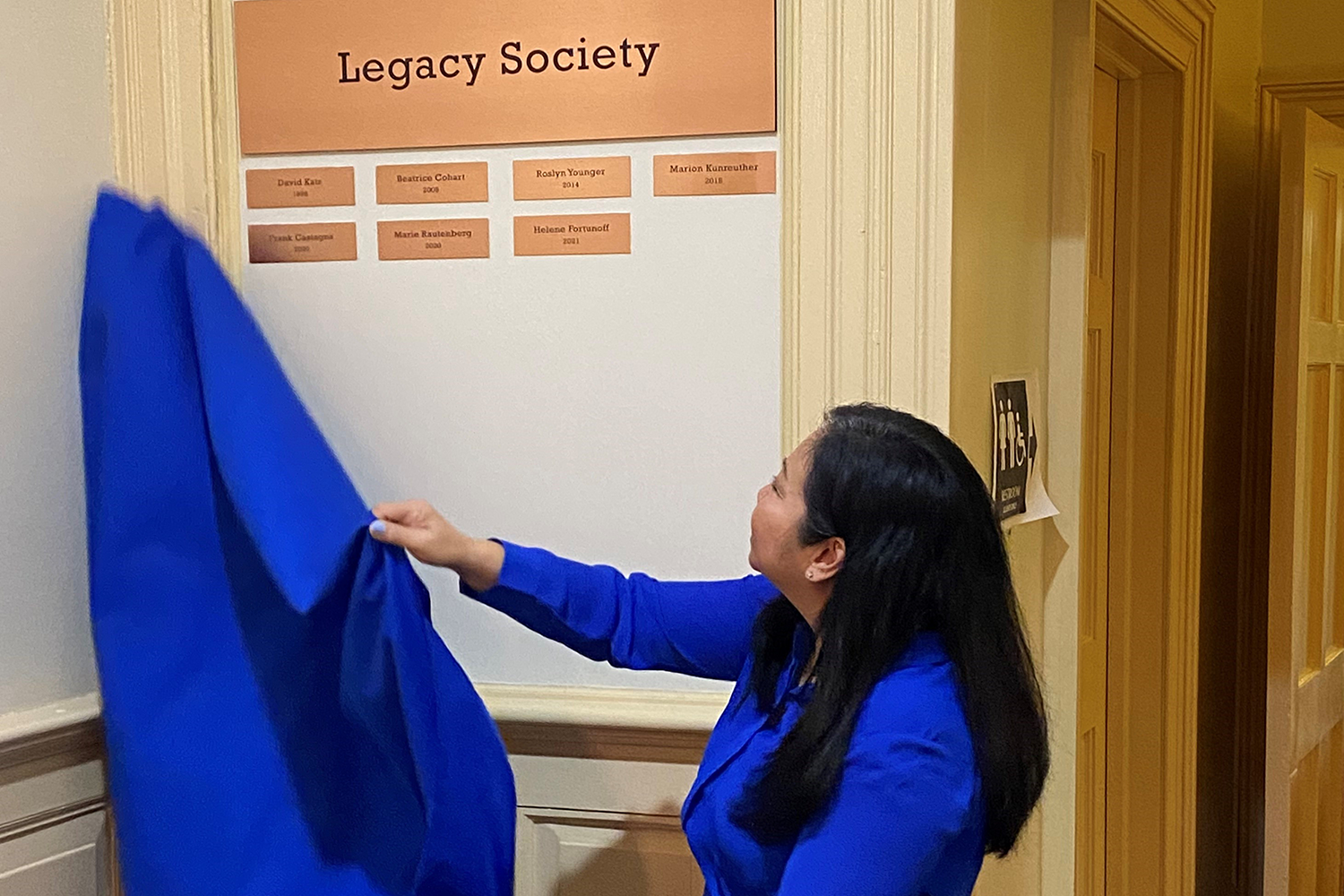
There are so many ways to give, in ways both large and small. Some of our donors choose to put us in their estate plans, like our dear friends highlighted on our Legacy Wall of Respect at our Roslyn Heights headquarters. Others have made substantial gifts to support our Douglas S. Feldman Suicide Prevention Project, and they are honored with beautiful brass name plaques on our Butterfly Wall.
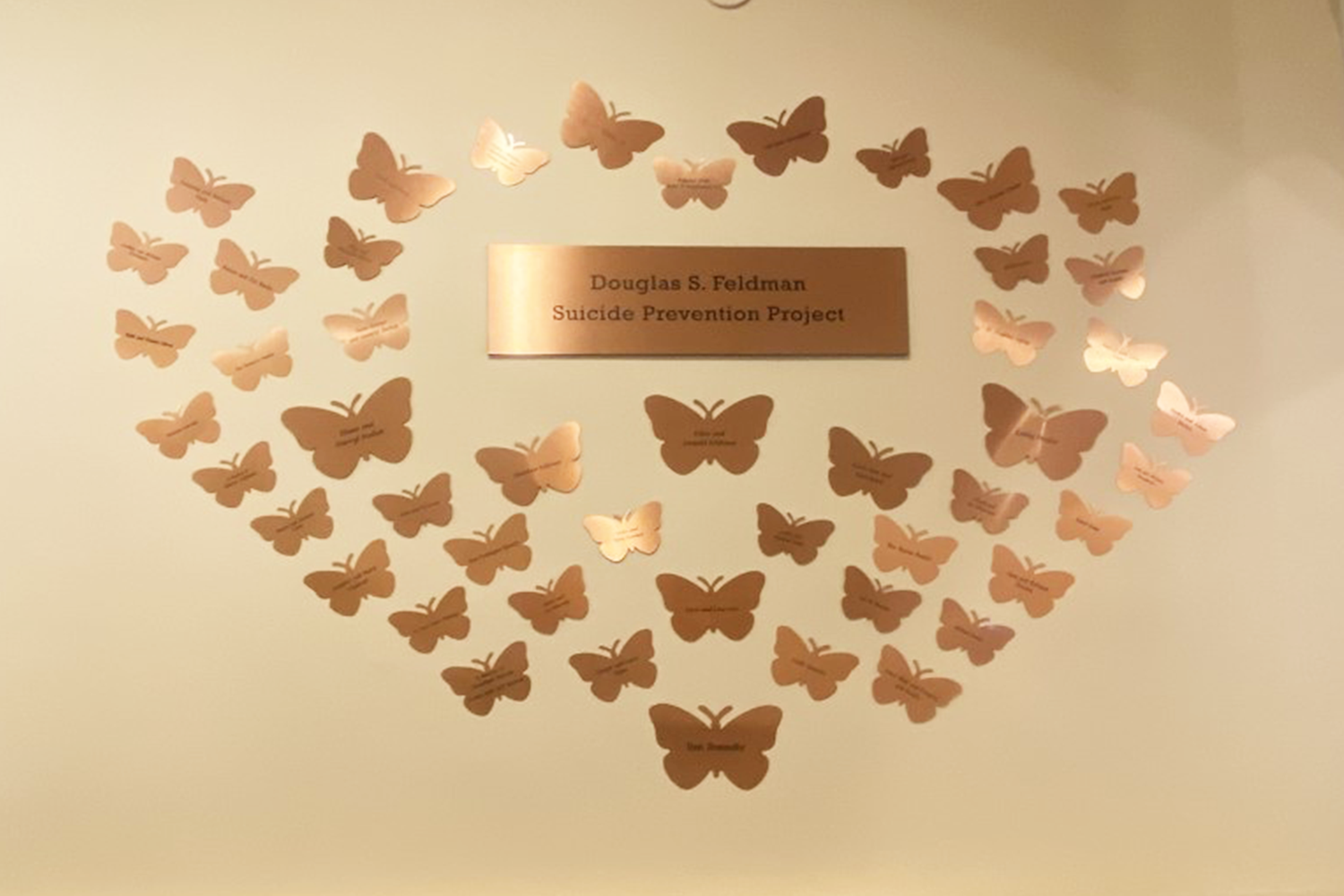
Others contribute through a Qualified Charitable Distribution, also commonly known as an IRA Charitable Rollover gift.
Many of our supporters buy tickets and/or sponsorships to our special fundraisers held throughout the year, including our Spring Luncheon, which will be held on April 27th, our Jonathan Krevat Memorial Golf & Tennis Classic on June 5th and our spectacular Annual Gala on September 28th.

Financial support also comes to us in the form of corporate matching gifts and/or workplace giving opportunities. Check to see if your company can match your gift.
In addition, monthly donations through our $10 on the 10th program, memorial gifts and gifts in honor of a loved one are always appreciated.
But financial contributions aren’t the only way to support our work. Options include joining one of our event committees, volunteering at our Children’s Center at Nassau County Family Court or connecting us with your company.
Whatever way you give back, please know that your generosity means the world to us – and to the children and families we are so privileged to serve.
We’re here for them because YOU are here for us. Thank you for your generosity!
If you wish to learn more about how to make a gift of any kind, please contact Lauren McGowan, Director of Development, at 516-626-1971, ext. 320 or email her at lmcgowan@northshorechildguidance.org

by North Shore Child & Family Guidance Center | Feb 1, 2023 | Blog
By Guest Blogger Aieshah Ashfer
As we all start to get used to the rhythm of the new year by embracing new beginnings, we may begin to feel as if we are in an unwanted emotional slump. Going back to work, school and the rigid routines we’ve formed for ourselves after a period of rest and relaxation isn’t easy. This is especially the case when bouncing back from the holiday season. The letdown we feel after the holidays can be described as the “post-holiday blues.”
What are post-holiday blues?
Post-holiday blues share many of the same characteristic symptoms of an anxiety or mood disorder: insomnia, low energy, irritability, difficulty concentrating and anxiousness. The abrupt withdrawal of stress hormones after a major event – in this case, the holidays – can greatly impact our biological and psychological well-being. Even if your holidays weren’t as merry as they could have been, the brain heavily exaggerates the realities of day-to-day life, making the return to the mundane seem profoundly more anxiety-inducing and saddening than it actually is.
What causes post-holiday blues?
The exact cause of these feelings will vary from person to person, but often they are triggered by unrealistic expectations of what the holiday season should be like. Post-holiday blues are often the result of failing to put boundaries on demands and then feeling sad about the outcome.
How do I cope with post-holiday blues?
There are several ways to cope if you feel down after the holidays. One way to do this is through a small gratitude practice. List the things you are thankful for and make that a daily practice combined with meditation; that simple act can really reframe the way that you manage your day and manage some of these stressors. Exercise can also help you deal with feelings of sadness after the holidays. Physical activity reduces stress and stimulates the production of feel-good chemicals, also known as endorphins. So can volunteering and giving back to your local community. It can also help to seek out humor, such as watching funny movies or TV shows, because laughter releases endorphins. Finding a trusted person to talk to about your feelings, such as a friend or a therapist, is especially beneficial. It can be harder to manage sadness or guilt if you keep them bottled up, but talking through those feelings can help to validate them.
Dealing with post-holiday blues isn’t easy. It is normal to feel these emotions after a big anticipated event like the holidays, but knowing that there are numerous healthy ways to cope with this letdown makes it much easier to get through it.
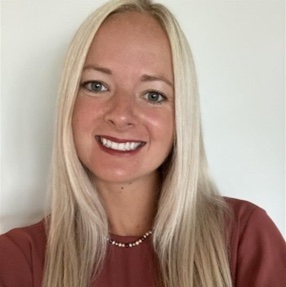
by North Shore Child & Family Guidance Center | Feb 1, 2023 | Blog
By Guest Blogger Aieshah Ashfer
Aieshah: Can you tell me what you do daily as a High School Social Worker?
Mrs. Sheets: Every day is different. I typically have each period of the day scheduled by students who want to come in for a group session or an individual session. The framework that I use is dialectical behavioral therapy (DBT) and cognitive behavioral therapy (CBT) and I also utilize the strengths perspective. I use DBT to help students understand and accept their difficult feelings, and learn skills to manage them. CBT is used to connect thoughts, behaviors, and emotions together. I use the strengths of each student and treat them with unconditional positive regard in our sessions. Overall, I try to destigmatize reaching out for help and I try to make the environment seem comfortable and warm for students to be able to reach out.
Aieshah: You are around students all the time. What are the main stressors in high school? Any specific ones this time of year?
Mrs. Sheets: At our school, I think there is a lot of pressure to be successful. That’s the number one stressor that I see here. I think students internalize that pressure and then what comes out is anxiety and depression, fear of failure, and perfectionism. At times I also see students neglecting their sleep, social relationships, and passions; these are all the things that make us human. I think sometimes we focus so much on being intelligent and successful, that we forget the other things that balance us out. I also feel students can’t talk to people in their lives for support and I think sometimes they feel what they’re going through is not valid. At this time of year, midterms seem to highlight students’ pressure on themselves and their need to succeed as well as the neglect of their health. These are the biggest stressors.
Aieshah: What are some ways to properly cope with the stress of finals and midterms?
Mrs. Sheets: When it comes to big tests like midterms, finals and even SATs, I feel that preparation is key. The best way to take these on is to make a schedule to study regularly weeks before. I see a lot of students at times will procrastinate and cram all their studying for the last day, and I think that builds even more pressure. Even studying for five minutes a day is better than not studying at all and cramming. Let yourself balance your activities so that you’re not sacrificing sleep and social interaction. Everything should be within balance, especially during these testing seasons. Since midterms also come after the holidays I think we’re left with a lot of mixed emotions; around the holidays can be one of the most depressing times of the year. Self-care is tuning into that and recognizing that this time of the year is stressful, and doing something that helps you; this can be listening to music or spending time talking to your friends. Have a little thing to look forward to each day, like meditating or exercise.
Aieshah: Is there a quick meditation technique you would recommend for stressed-out students?
Mrs. Sheets: I think you mentioning “quick” is very important. Students often say they can’t take the time out to meditate during the day. This is where our technology comes in and is so valuable to us. If you just go on YouTube to find a one-minute meditation tutorial, you’re able to take a short break and relax. I tell students who don’t want to compromise any time that they can meditate while they’re doing any task– for example, brushing their teeth. Put on a one-minute meditation video so you’re able to take a break. Even a small meditation break is an important one.
Aieshah: What are some resolutions students should keep to avoid academic stress and burnout for the new year?
Mrs. Sheets: I think a resolution students should set is to focus on progress, not perfection. This can be done through positive self-talk; it sounds unrealistic at times but can really bring us up from negative places. Even when it comes to homework, instead of saying “I have to do this,” start to say “I want to do this because I want to earn a positive grade.” Keeping a neutral mindset after setbacks as well can really help you in the future. But being able to talk to yourself positively is extremely important and will help you to more easily accomplish tasks. Positive self-talk and progress over perfection should be the things we bring into 2023.
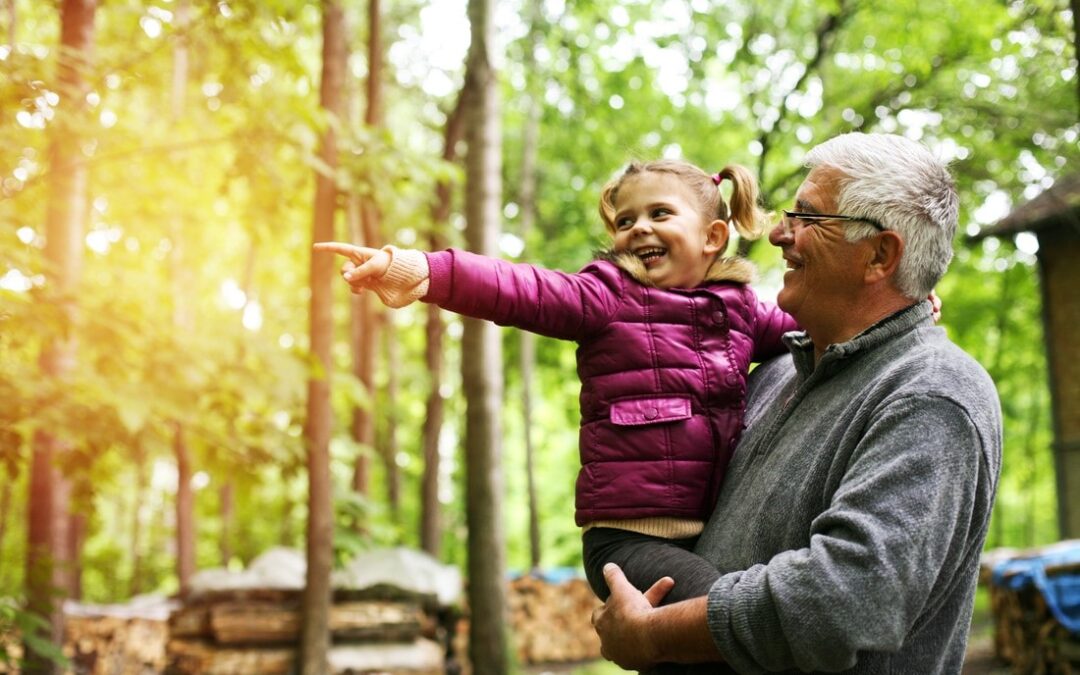
by North Shore Child & Family Guidance Center | Jan 25, 2023 | Blog
When a child faces a mental health challenge, the entire family is impacted. But while people may sympathize with parents and siblings, they often forget that grandparents also struggle with feelings of sadness and helplessness.
That’s why North Shore Child & Family Guidance Center (the Guidance Center) runs a free support group just for grandparents whose grandchildren are on the autism spectrum: GASAK, for Grandparent Advocates Supporting Autistic Kids.
GASAK’s mission is to support, inform and advocate for grandparents with autistic grandchildren. At meetings held on the last Thursday of each month, GASAK participants network and share information on issues critical to families impacted by autism. New members are welcome to join at any time.
While the program isn’t new, it recently returned to in-person meetings at the Guidance Center’s Marks Family Right from the Start 0-3+ Center in Manhasset after being virtual since the start of the pandemic.
While there are many programs for parents of autistic children, few if any address the specific issues that come up for grandparents, said Dr. Sue Cohen, Director of Clinical Services at Right from the Start. “Sometimes the parents are overwhelmed dealing with their children’s needs,” she said. “At GASAK meetings, grandparents can share their own concerns with their peers.”
One GASAK member said, “A lot of times your friends can’t relate to what you’re going through, but when you walk into the GASAK group, you feel comfortable instantly. Nobody judges you.”
The program occasionally features guest speakers, including education lawyers, social workers, special education advocates and others. “When a grandparent leaves a meeting,” said Cohen, “they walk away with information that can make a huge difference in the lives of their children and grandchildren.”
But the camaraderie members experience is perhaps the most important benefit of the group. Case in point: one grandmother who has two autistic grandsons who were nonverbal until they were three years old. When one of them said “Mom” for the first time, the GASAK group celebrated her good news. “There is such compassion among members,” she said. “And by sharing our worries as well as our joyful moments, we give new members hope.”
In addition, the Guidance Center provides a variety of therapeutic services for children on the autism spectrum, as well as their parents and other family members. They also provide testing for preschool-age children to young adults.
To learn more about the GASAK group and all the Guidance Center’s services, contact Cohen at 516-484-3174 or email scohen@northshorechildguidance.org.
About Us:
As the preeminent not-for-profit children’s mental health agency on Long Island, North Shore Child & Family Guidance Center is dedicated to restoring and strengthening the emotional well-being of children (from birth – age 24) and their families. Our highly trained staff of psychiatrists, psychologists, social workers, vocational rehabilitation counselors and other mental health professionals lead the way in diagnosis, treatment, prevention, training, parent education, research and advocacy. The Guidance Center helps children and families address issues such as depression and anxiety; developmental delays; bullying; teen pregnancy; sexual abuse; teen drug and alcohol abuse; and family crises stemming from illness, death, trauma and divorce. For nearly 70 years, the Guidance Center has been a place of hope and healing, providing innovative and compassionate treatment to all who enter our doors, regardless of their ability to pay. For more information about the Guidance Center, visit www.northshorechildguidance.org or call (516) 626-1971.

by North Shore Child & Family Guidance Center | Jan 18, 2023 | Anton Media, Blog, In The Media
By Kathy Rivera
This column appeared in January 11, 2023 issue of Anton Media newspapers
All of us have experienced unprecedented challenges in the last three years, resulting in heightened levels of anxiety and stress. So much is out of our control, and that can feel overwhelming. But there are steps you can take to safeguard your wellbeing and that of your family.
As you welcome in 2023, take the opportunity to put into place some of these eight resolutions to start the New Year off right.
- Tune in and turn off: Sure, your kids need to be told to put the phones away at the dinner table and when they’re doing homework. But they’re not the only ones who overuse the tech gadgets. When you are with your kids, be fully present. The years really do fly by.
- Be a role model: Believe it or not, your children and teens look to you as their example of how to act in the world. For your sake and theirs, eat healthfully and exercise, spend more time outdoors, and be sure to…
- Put self-care in your list of priorities: As parents, we sometimes think our job is to sacrifice ourselves for the sake of our children. But if you don’t take care of yourself, you’ll have nothing left to give them. Take the time to engage in activities that make you feel happy, confident and healthy.
- Don’t compare yourself to other parents or your kids to other kids: Facebook and other social media platforms make it look like every parent has the perfect child—the honor student, star athlete, community volunteer, etc. But these are just self-selected pieces of information and don’t paint a true picture. Every parent faces challenges, and no one is perfect.
- Don’t take the bait: Kids push our buttons, there’s no doubt about it. But when you respond to your tot’s tantrum with a tantrum of your own, it doesn’t help the situation and only creates more chaos. When they are acting up, take a deep breath and remember that the goal is to respond thoughtfully, not react impulsively. One way to hone this skill is to…
- Practice meditation. Numerous studies show that even a few minutes a day of meditation will help reduce your stress. Not sure how? Google “how to meditate” and you’ll find lots of helpful tips and videos. You can also google “meditation on Long Island” to find a group. And invite your kids to try it out, too! Let them know supercool celebrities and athletes like Selena Gomez, Lady Gaga, Lizzo, Derek Jeter and LeBron James are big meditators.
- Listen closely and talk less: When our children come to us with problems, it’s our natural inclination to try to fix things for them. But the reality is, often what they need is just to be heard. Make a promise to yourself that you will listen to your kids and not jump in right away to solve the problem. To open the lines of communication, simply ask, How are you feeling?
- Pay attention and give praise: The way you communicate with your child not only teaches them how to communicate with others, it shapes their emotional development and how they build relationships later in life. Giving your child positive attention for good behavior can boost their self-esteem, improve your relationship and help your child understand the behaviors you like and want to see more often.
Wishing you and your family a happy, healthy and peaceful New Year!
Bio: Kathy Rivera, LCSW, the Executive Director/CEO of North Shore Child & Family Guidance Center, Long Island’s leading non-profit children’s mental health organization. To get help for your child or to support the Guidance Center’s lifesaving work, call (516) 626-1971 or visit www.northshorechildguidance.org.

by North Shore Child & Family Guidance Center | Jan 9, 2023 | Blog
As we welcome 2023, we are grateful for the dedicated employees who make North Shore Child & Family Guidance Center such a valuable resource to our community. We are also thankful for all of you who support our work!
Each year, we ask our staff members what their hopes and dreams are for the year to come. Here are some of their responses.
“The New Year brings in new opportunities and new adventures. Wishing everyone a safe, healthy, and prosperous new year. May the tears you cried in 2022 water the seeds you’re planting in 2023.” – Kathy Rivera, LCSW, Executive Director/CEO
Photo: Kathy (left) with colleagues Joan and Nicole at our holiday party
“My hope for the New Year is for more kindness shared around the world. My wish for the New Year is for health and happiness for my family, my friends and my wonderful colleagues. My dream for the New Year is to help people in need of support/ guidance.” – Francesca Carbone, LMSW
Photo: Francesca
“I will be spending New Year’s Eve en route to Antarctica and my hope is for a safe crossing over the Drake passage! I feel grateful for the opportunity to experience my 7th continent and am looking forward to more great travel adventures with my family in the future.” – Lauren McGowan, Director of Development
Photo: Dash McGowan
“My hope for the New Year is to continue to grow and learn.” – Diana Kutulos, LMSW
Photo: Buzz Kutulos
“My hope for the New Year is that everyone is healthy and cherishes time with their friends and families. To wake up each day and try to find peace within themselves and to spread that to those they encounter. I hope people find new friends, new hobbies, new passions that add joy into their lives. Happy New Year!” – Kate Braumuller, Research Coordinator
Photo: Kate and her grandmother celebrating the holidays
“My wish is for more happiness and peace in 2023.” – Nicole Oberheim, Development Manager
Photo: Andreas, Markus and Kiersten Oberheim
“Embracing the ‘gratitude train’ is something I want to work more on in the New Year.”
– Diane Stranieri, MS, RN
“My wishes for 2023 are good health, happiness and for the world to be a better place for EVERYONE! “ – Pascale Nerestant, Westbury Outreach Worker
Photo: Pascale
“My hopes/wishes/dreams for the new year are for myself and my family to remain healthy and to be at peace. I strive to continue being my best self.” – Dollicia M. Torres, Front Desk Coordinator
Photo: Dollicia
“My wish for the coming year is that all of the people that I care about, friends and family, find their peace, have things that bring them joy, and heal. I hope that I can create a space for that to take place, a soft place to land when in stormy seas. I want the best for everyone. May we all always have a light in the dark.” – Marisa Padgett, LCSW
Photo: Rocket Padgett
“One of my hopes is that all shelter animals find loving homes. Rescue pets are the best!” – Jenna Kern-Rugile, Director of Communications
Photo: Jenna and Lucy
“My hopes for the New Year are for us all to have as much peace as possible!
– Gillian Uhl, LMSW
“May 2023 be filled with happiness and peace for all. Happy New Year!” – Julia Bassin, LCSW
Photo caption: Piper and Lorelai Bassin
“My dream for the New Year is to start a podcast based around mental health. I want to spread awareness and be a voice for people who might not have the courage to do so. I want people to know how serious it is and how it could affect people and their families. My hope for the New Year is ending gun violence; a close family friend of mine lost a significant other due to gun violence and it’s just unacceptable. – Laisha Rivera, Support staff/front desk
Caption: Laisha
“May the New Year enhance appreciation for one’s blessings, incite deeper reflections, and pique one’s willingness to navigate intrepidly in opposition of life’s uncertainties”. -Lydiane Interdonato, MS, Community and Home-Based Services/Case Manager
Photo: Lydiane
“To lose enough weight so that ALL my clothes fit with enough room to breathe. To get closer to my higher power. Peace on Earth. Improve environmental woes all over the world. Guidance Center patients find hope and peace. Continue to build strength in the team meeting system.” – Ruthellen Trimmer, Psychiatric Nurse Practitioner and Clinical Specialist
Photo: Ruthellen

by North Shore Child & Family Guidance Center | Jan 4, 2023 | Blog, In The Media, Newsday
Newsday, January 4, 2023
Thank you for highlighting the crisis in access to mental health services among our youth as rates of depression, anxiety and suicidal thinking are at all-time highs in your cover story of December 27, 2022.
While the pandemic has exacerbated the struggles of children and teens, the difficulty in finding timely and affordable quality mental health care isn’t new. In 2017, North Shore Child & Family Guidance Center conducted extensive research, spotlighted in our Project Access report, shining a light on the longstanding problem and advocating for strategies to effect change.
Throughout our 70-year history, we have been providing mental health services to the children and families of Nassau County within just days of receiving their call, and no one is ever turned away for inability to pay. Kids in crisis can’t wait weeks or months for help.
Kathy Rivera
Executive Director/CEO
North Shore Child & Family Guidance Center
Roslyn Heights, NY

by North Shore Child & Family Guidance Center | Dec 26, 2022 | Blog
By Dr. Nellie-Taylor Walthrust, this story was published in Anton Media.
Many parents worry throughout the year about their teens’ exposure to alcohol and drugs, but the concern is magnified when talk of New Year’s Eve parties enters the conversation.
While you don’t want to spoil their opportunity to ring in the New Year with their friends, especially after nearly three years of pandemic disruption, the thought of them being at parties where alcohol and possibly drugs are being used is justifiably concerning.
The biggest risk that kids face on New Year’s Eve – or any day of the year, for that matter – is being involved in a car accident. According to the Centers for Disease Control and Prevention, motor vehicle crashes are the leading cause of death for U.S. teens, with eight teens ages 13 to 19 dying every day from motor vehicle crash injuries.
Additional statistics point out the risks:
- 23% of teens admit they have driven under the influence of alcohol, prescription drugs or marijuana.
- Teen drivers 16-19 have a fatal crash rate almost three times as high as drivers ages 20 and older.
- 60% of all teen deaths from car accidents involve alcohol.
- 24% of teens reported that within the previous month, they had ridden with a driver who had been drinking alcohol or using drugs.
As a parent, what can you do to minimize the risks?
If your teens plan to go to a party, make sure you talk to the parents where the festivities are being held. Your teen might be horrified at this prospect, but you have every right to discuss your expectations with the hosts. Ask if alcohol is being served (and if your teens are under 21, the answer should be a resounding no). Ask if the parents will be home at all times during the party. If they won’t, don’t be afraid to tell your teens they aren’t allowed to go.
Once you are assured that parents will be there to supervise and the party is alcohol-free, nail down the details. That means finding out who is driving them and taking them home (the safest choice is for you to take on that role). Set a reasonable curfew based on their age. Young teens don’t need to be out past midnight, and even older kids can call it quits shortly after the clock strikes 12.
Establish a plan to check in several times during the night. Make it clear ahead of time that if you call or text and get no answer, you will be heading over to get them.
Not comfortable with the level of supervision at the party? Help your teens create alternative plans. The best way to know your kids are safe and in a supervised environment is to host the gathering at your home. Give them free reign in choosing decorations, food, music and other entertainment ideas, but make it clear that alcohol and drugs are forbidden.
Despite taking all precautions, the reality is that your teens may find themselves in a situation where they are being pressured to drink or use drugs. Tell them that you will be willing and able to get them at any time during the night—and that if they or their friends have been drinking, the most important thing is for them to contact you for a ride.
As parents, we must do all we can to educate our kids about the dangers of underage drinking, but we also need to face the reality that even “good” kids can start heading down a dangerous path. Keep the lines of communication open, and if you suspect there may be a problem, consider contacting a professional who is trained in alcohol and substance use.

Dr. Nellie Taylor-Walthrust is the Director of at North Shore Child & Family Guidance Center’s Leeds Place, which operates an Adolescent Outpatient Chemical Dependency Treatment Program. Substance use services include counseling youths who are alcohol and drug abusers, children who live in families with a parent who is suffering from alcoholism or drug addiction and youths who have co-occurring chemical dependency and mental health problems. Prevention services are offered to local school districts. Call (516) 626-1971 to find out more.
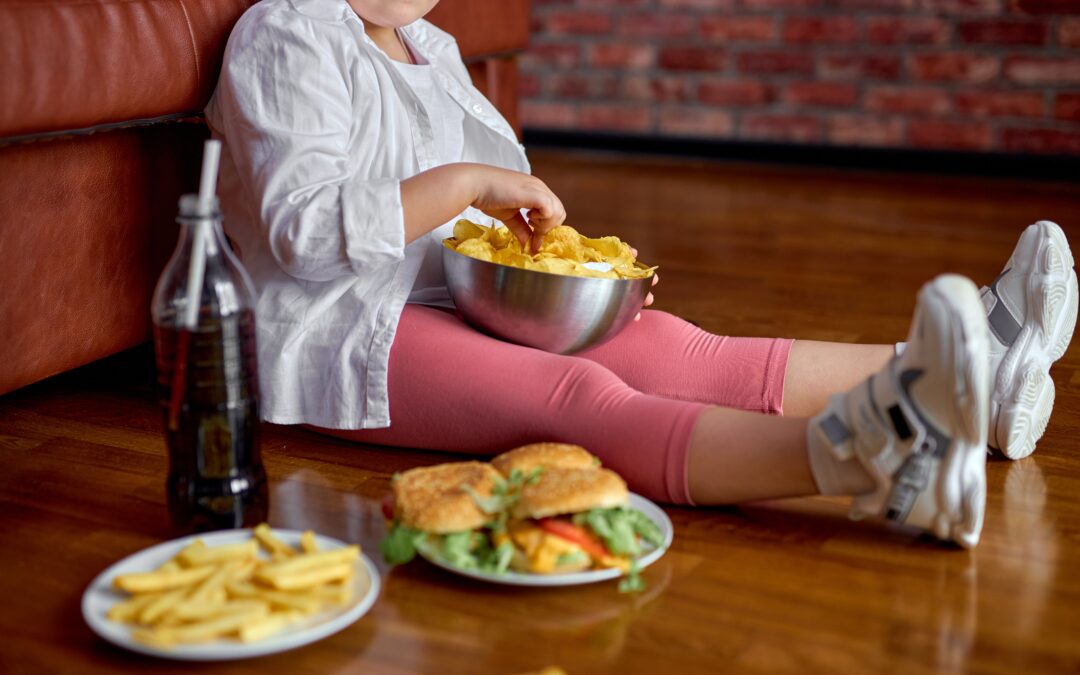
by North Shore Child & Family Guidance Center | Dec 19, 2022 | Anton Media, Blog, In The Media
By Dr. Sue Cohen, November 23, 2022
The holidays are here, and it’s not uncommon for people of all ages, including children, to pack on extra pounds. The sugary treats and heavy meals are abundant, and many kids tend to be less active during the colder weather.
But regardless of the season, it’s always a good time to talk to your kids about healthy eating—especially with many adults and children alike having put on weight from stress eating and inactivity due to the pandemic.
Sadly, being significantly overweight is common. According to the Centers for Disease Control and Prevention, the percentage of children and adolescents affected by obesity has more than tripled since the 1970s. Today, nearly 1 in 5 school age U.S. children and young people (6 to 19 years) is considered obese. When you factor in those who are considered overweight but not yet obese, the figure rises to 31%.
Why the dramatic increase? Behavior and habits are the most likely factors, with technology playing a big role. Many families have become sedentary, with TV, computers and videogames as the culprits. And it’s not just the kids; parents, too, are often modeling these behaviors.
Of course, shaming a child for being overweight is never appropriate. From a very early age, parents should nurture a positive body image with their kids, focusing on their bodies as the miracles they are! But if your child’s or teen’s weight has become a health concern, you can address it in a loving, non-critical way.
Approach the issue as a family topic rather than focusing on an individual child. The message should be that we all need to eat more healthy foods like fruit, vegetables and lean proteins and less fatty, fried or sugary foods so we feel better and have more energy. You don’t want to make your child feel badly about themselves, so focusing on healthy eating and activity rather than appearance is extremely important.
Here are some guidelines when broaching the subject of weight with your children, as per recommendations from The Academy of Nutrition and Dietetics:
Foster open dialogue. Encourage your kids to share their thoughts and feelings about body image. When children discuss feelings about weight, be sure to listen and acknowledge that the feelings are real. Explain that people come in all different shapes and sizes, and you love your child no matter what.
Don’t make negative comments. Judging your own body or your child’s can result in lasting detrimental effects to your child’s body image and relationship with food. Set a good example for children in the way you talk about your own body as well as others.
Take action. Children learn fast, and they learn best by example. Teach children habits that will help keep them healthy for life. Make it easy for kids to eat smart and move often. Look for ways to spend fun, active time together.
Avoid the blame game. Never yell, scream, bribe, threaten or punish children about weight, food or physical activity. If you turn these issues into parent-child battlegrounds, the results can be harmful. Shame, blame and anger are setups for failure.
Talk with your healthcare provider. If a health professional mentions a concern about your child’s weight, speak with the professional privately. Discuss specific concerns and ask for suggestions on making positive changes in your family’s eating habits and activity levels.
Seek advice. Look for a registered dietitian with a specialty in pediatric weight management. Many hospitals and clinics have comprehensive programs with education and activities for both kids and adult family members. Some of these options may be covered by your health insurance plan.
An important final note: If you are among the Long Islanders whose financial issues make it difficult to access healthy, fresh foods, don’t despair. Community Solidarity shares nutritious food to those in need, with 50% of that being fresh produce. To find out more, visit communitysolidarity.org.
Dr. Sue Cohen is the Director of Director of Clinical Services at Right from the Start at North Shore Child & Family Guidance Center, the leading children’s mental health agency on Long Island. Learn more at www.northshorechildguidance.org.





 Author Name: Dr. Hannah Yang
Author Name: Dr. Hannah Yang










 Dr. Nellie Taylor-Walthrust is the Director of at North Shore Child & Family Guidance Center’s Leeds Place, which operates an Adolescent Outpatient Chemical Dependency Treatment Program. Substance use services include counseling youths who are alcohol and drug abusers, children who live in families with a parent who is suffering from alcoholism or drug addiction and youths who have co-occurring chemical dependency and mental health problems. Prevention services are offered to local school districts. Call (516) 626-1971 to learn more.
Dr. Nellie Taylor-Walthrust is the Director of at North Shore Child & Family Guidance Center’s Leeds Place, which operates an Adolescent Outpatient Chemical Dependency Treatment Program. Substance use services include counseling youths who are alcohol and drug abusers, children who live in families with a parent who is suffering from alcoholism or drug addiction and youths who have co-occurring chemical dependency and mental health problems. Prevention services are offered to local school districts. Call (516) 626-1971 to learn more.









